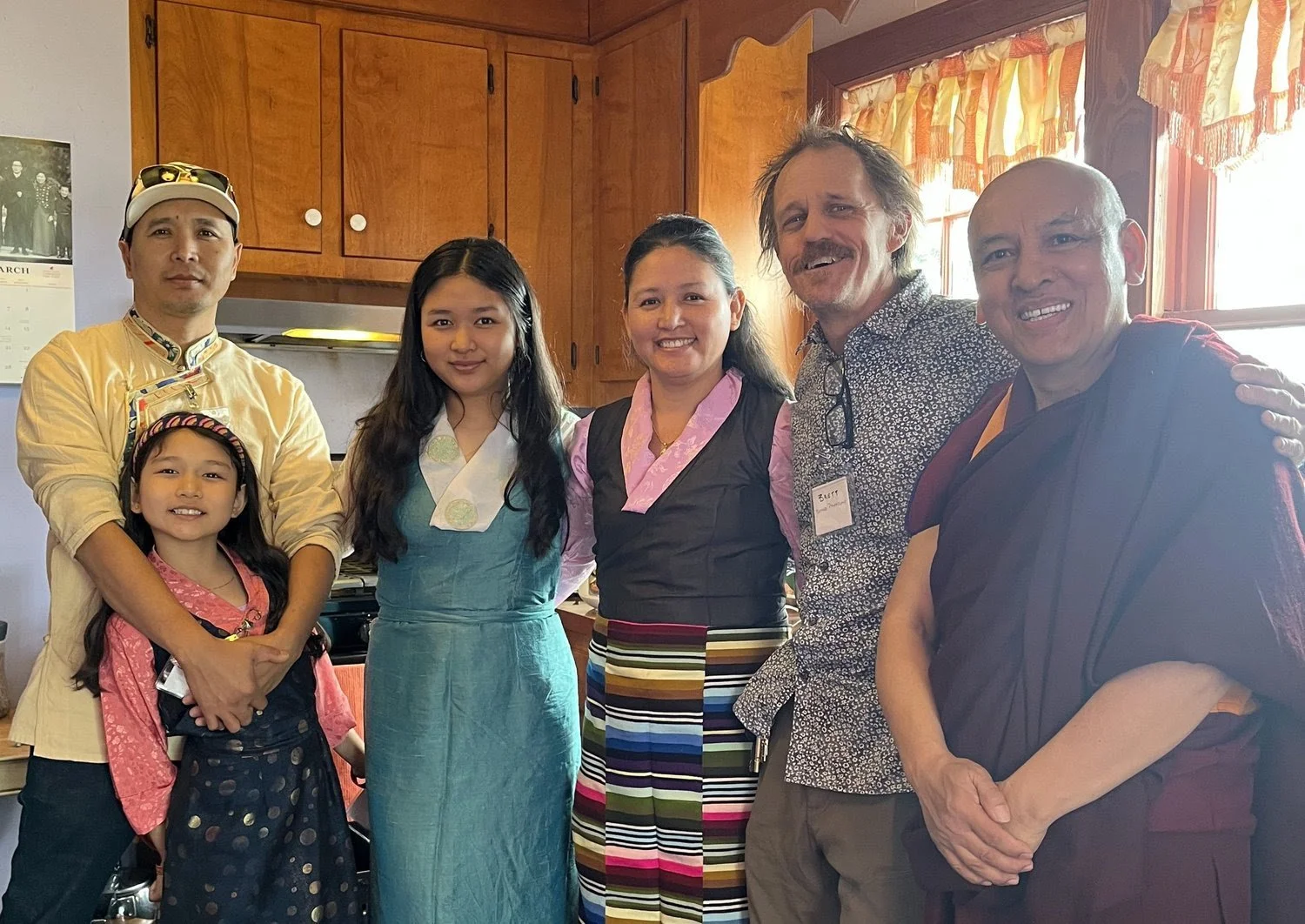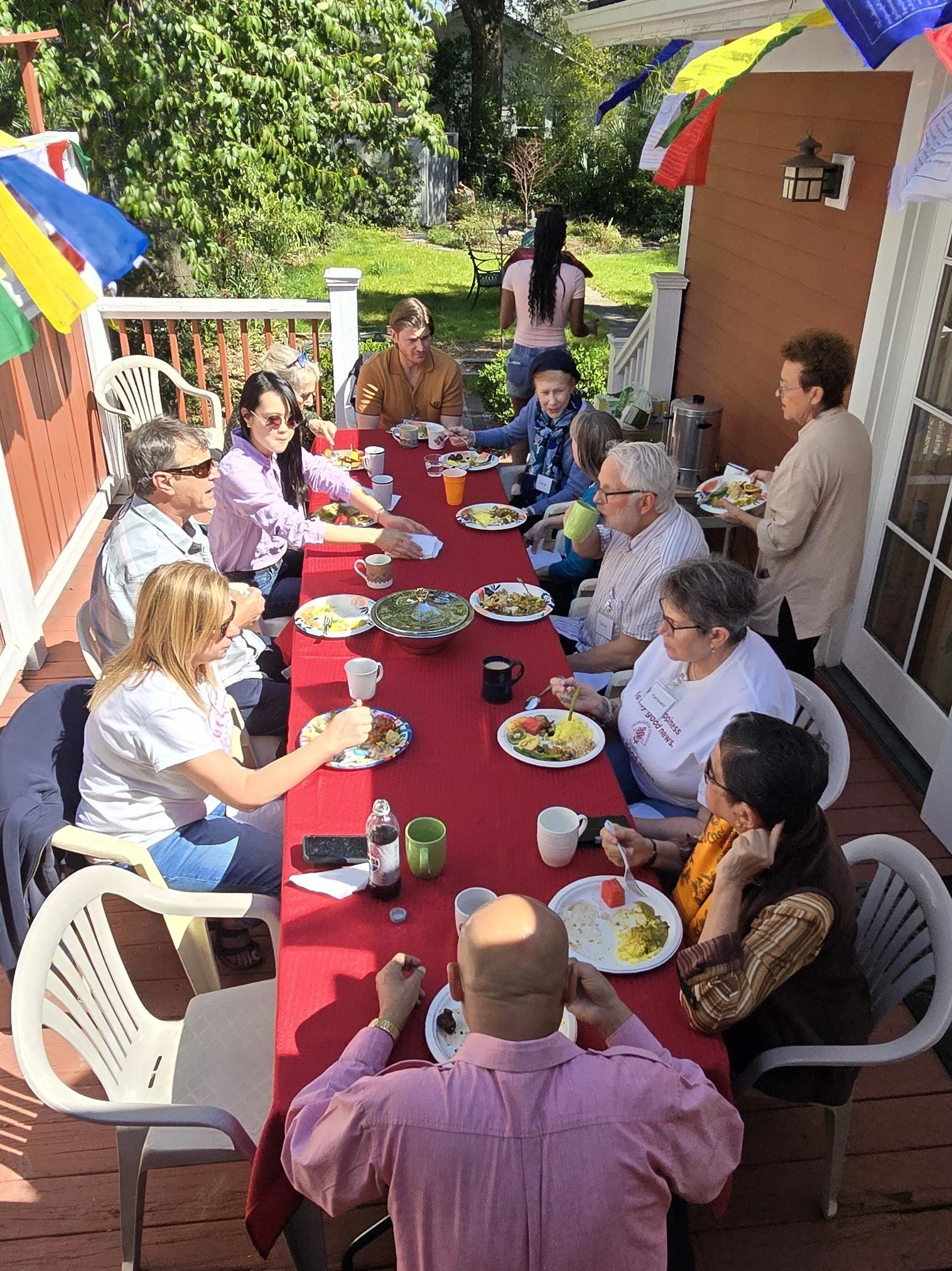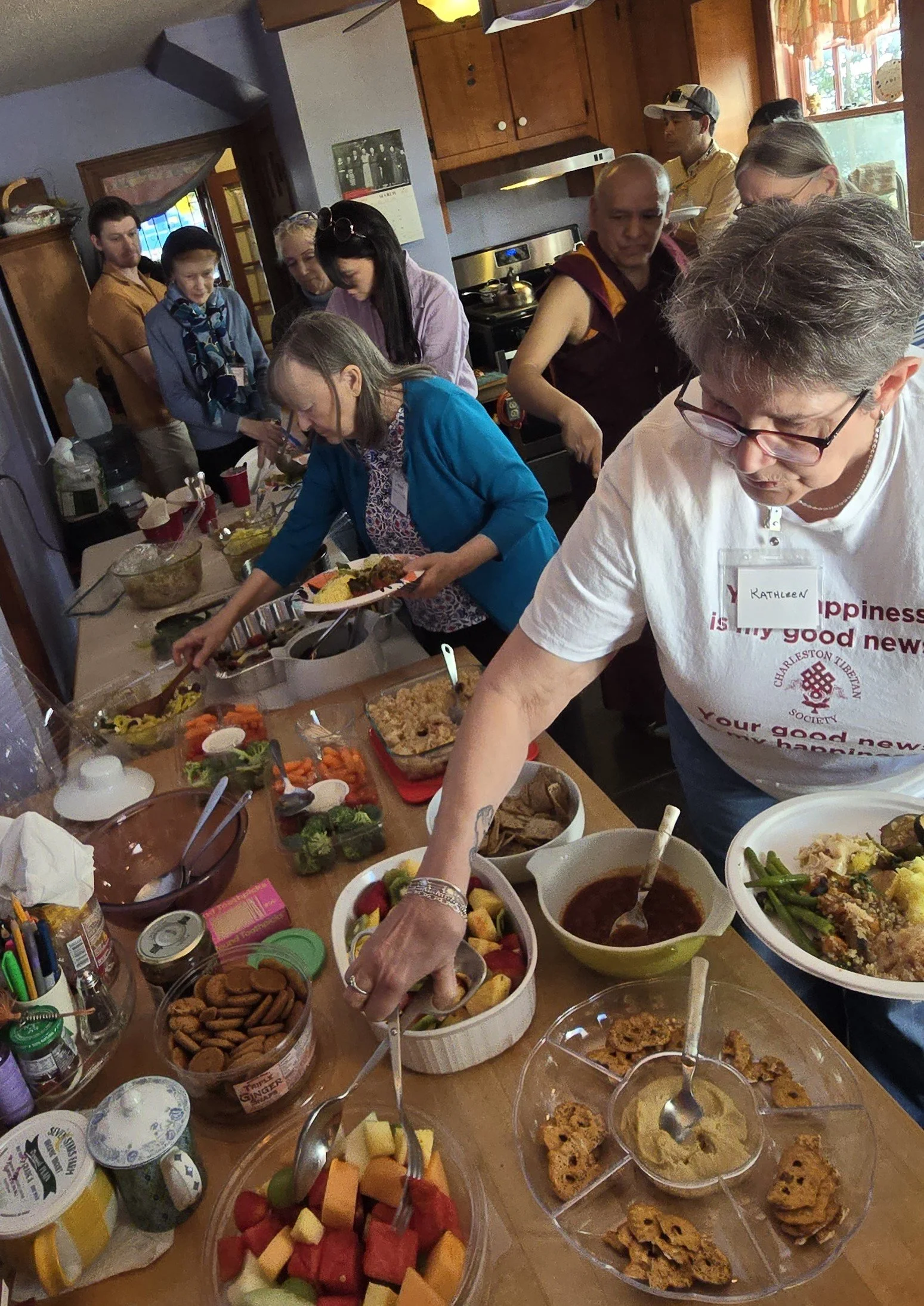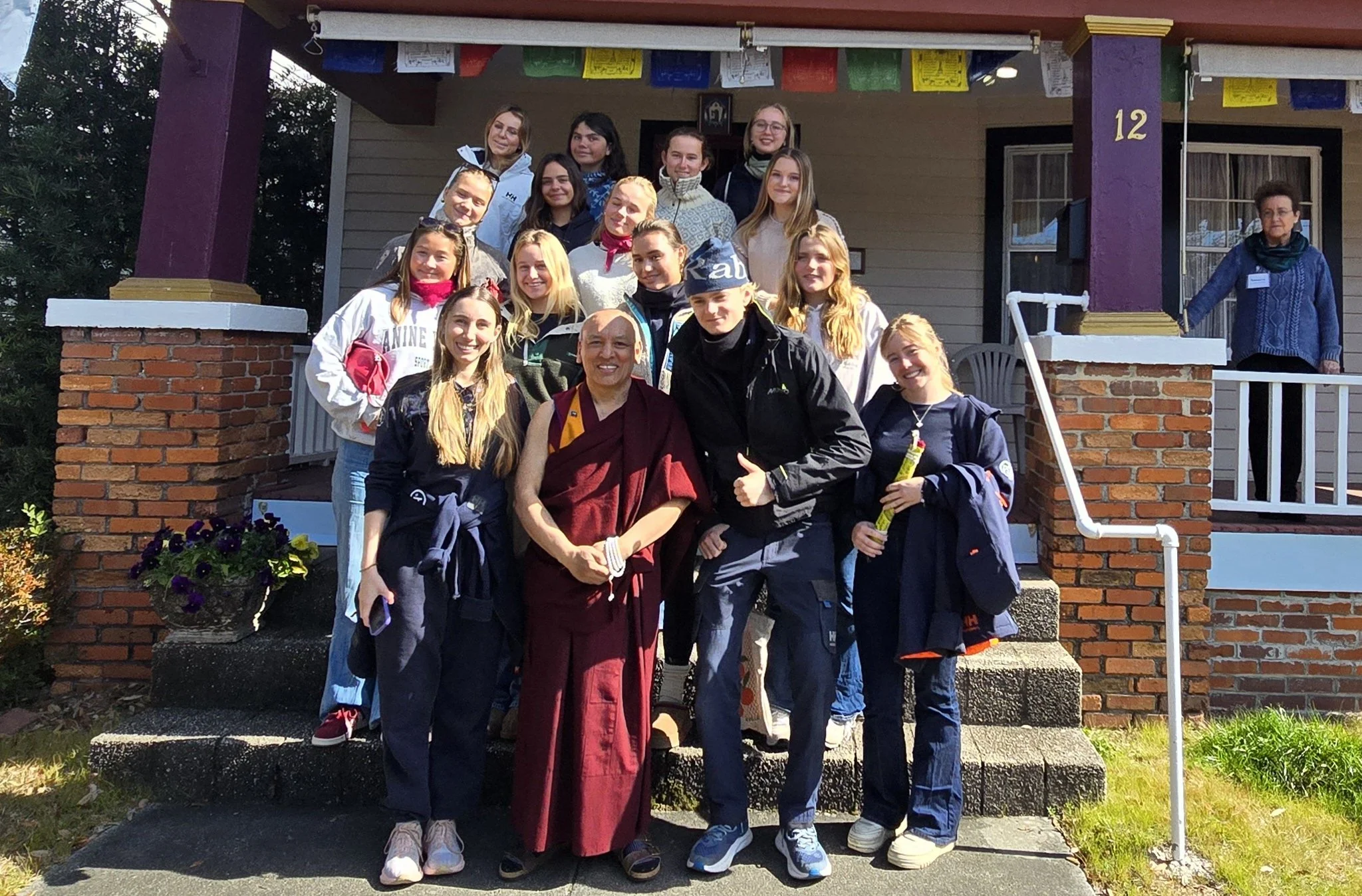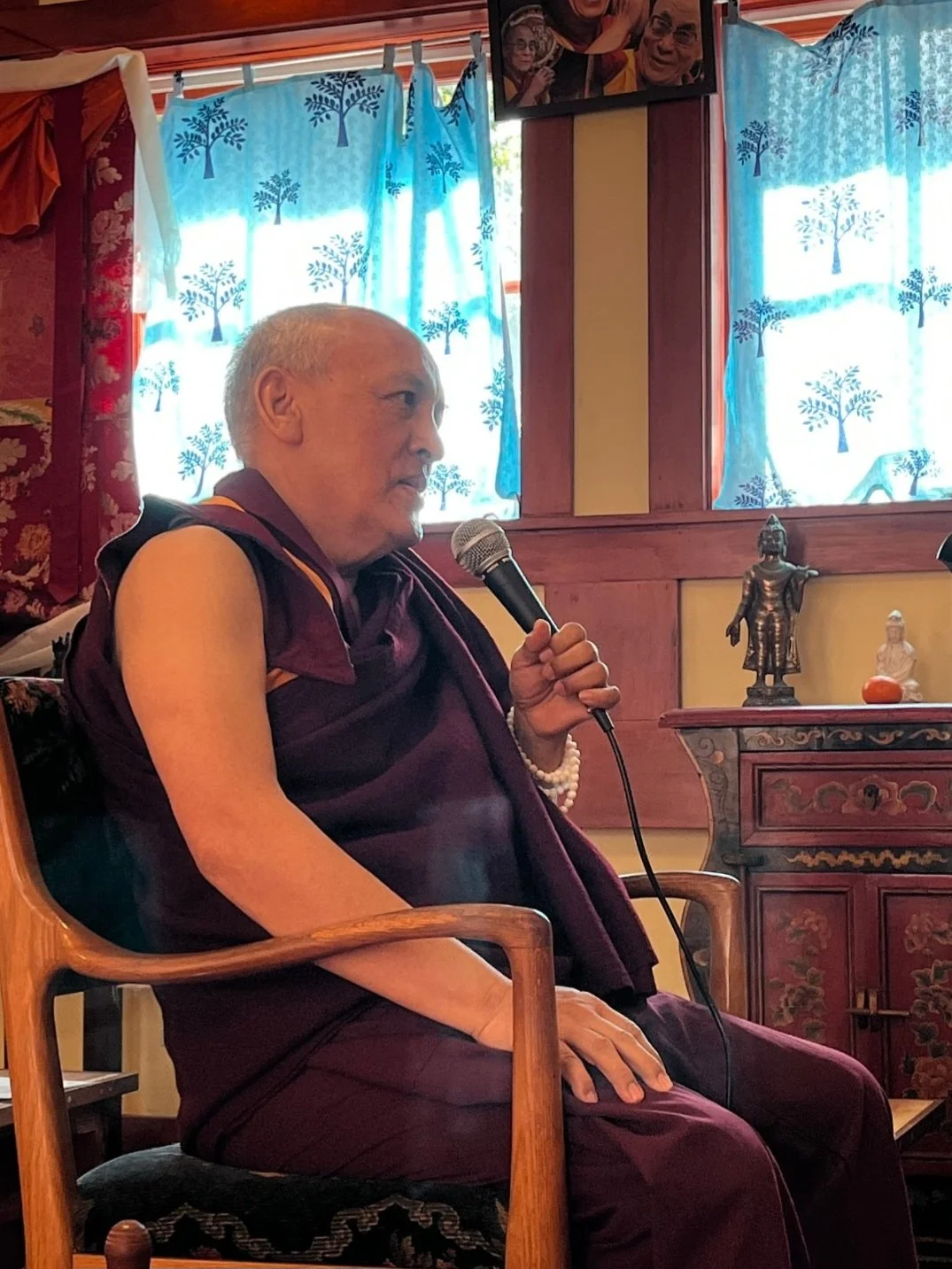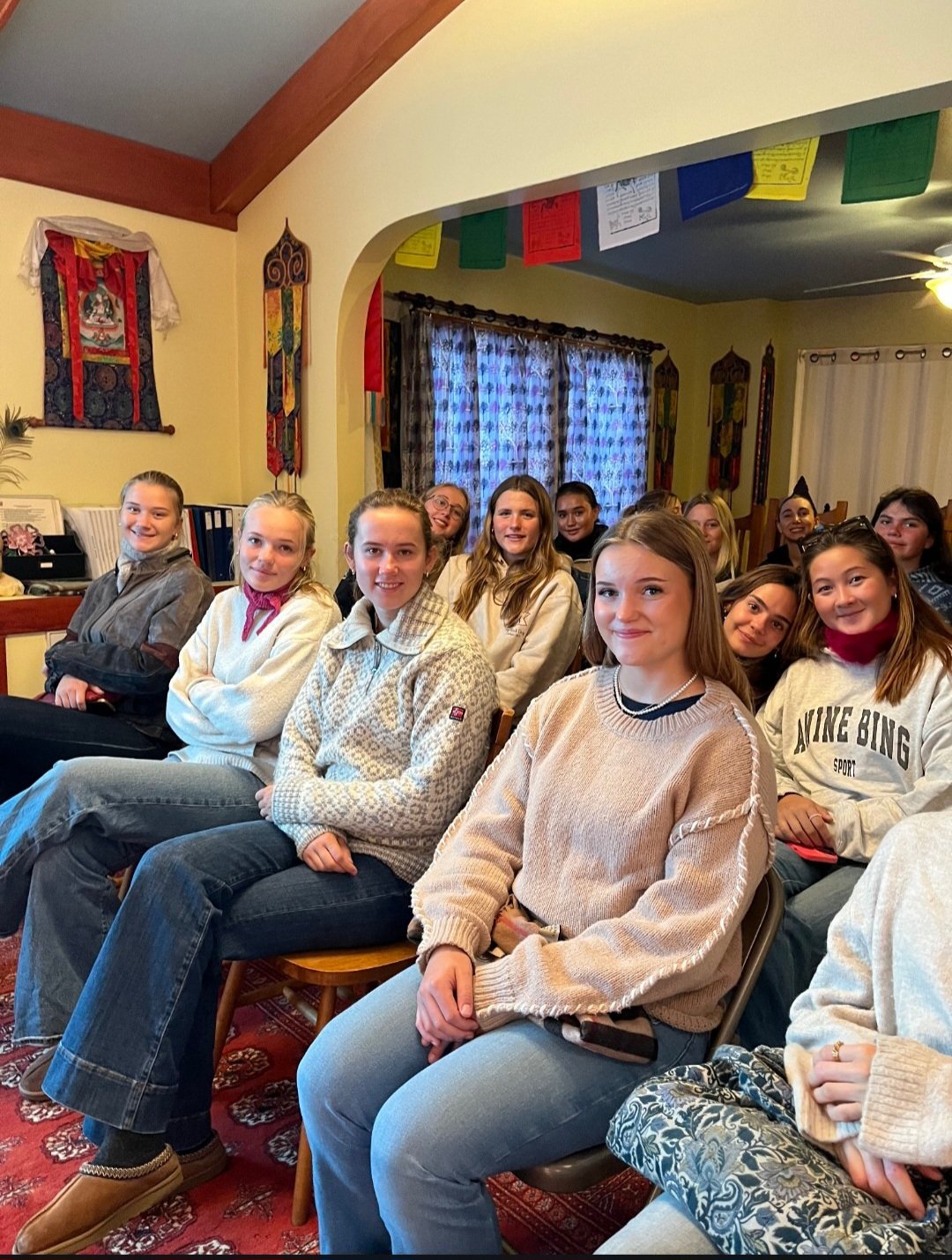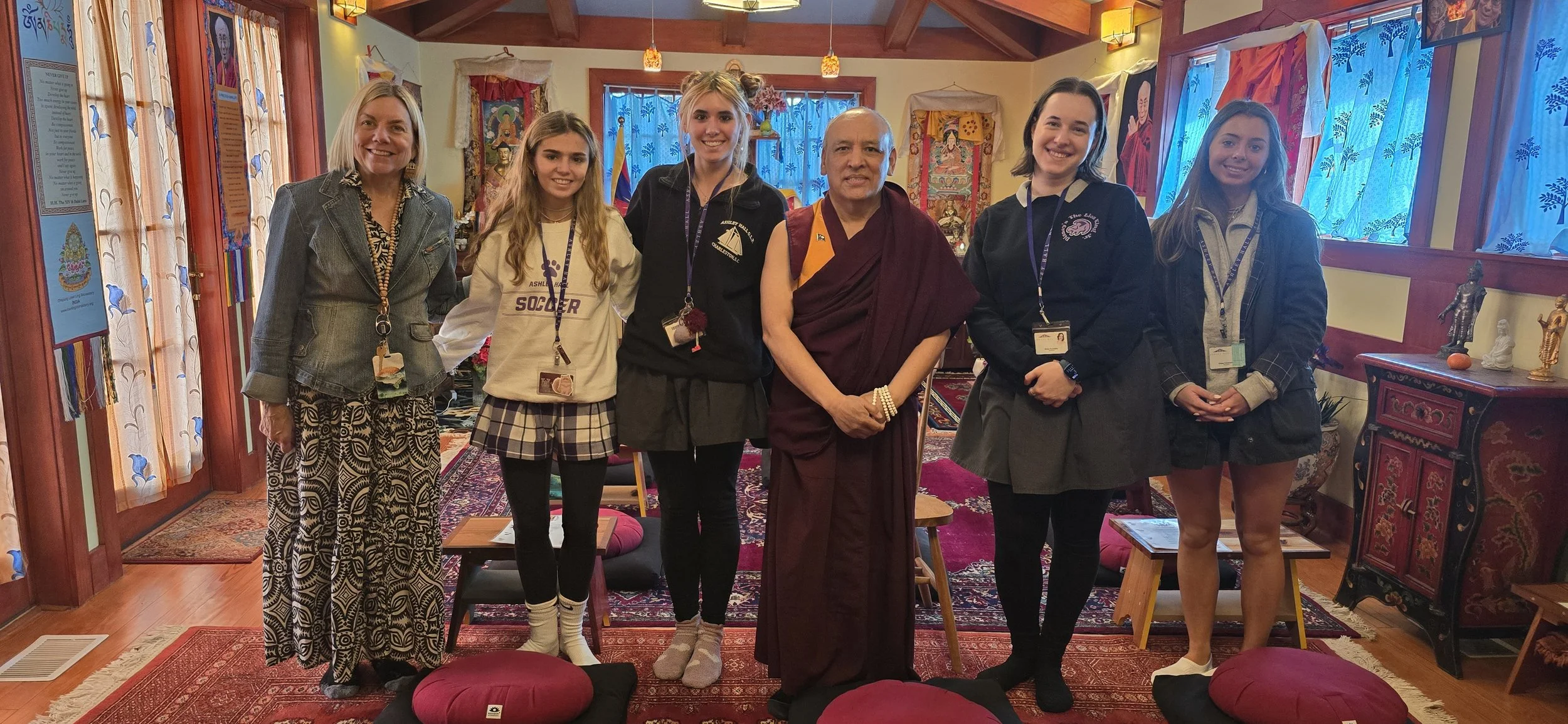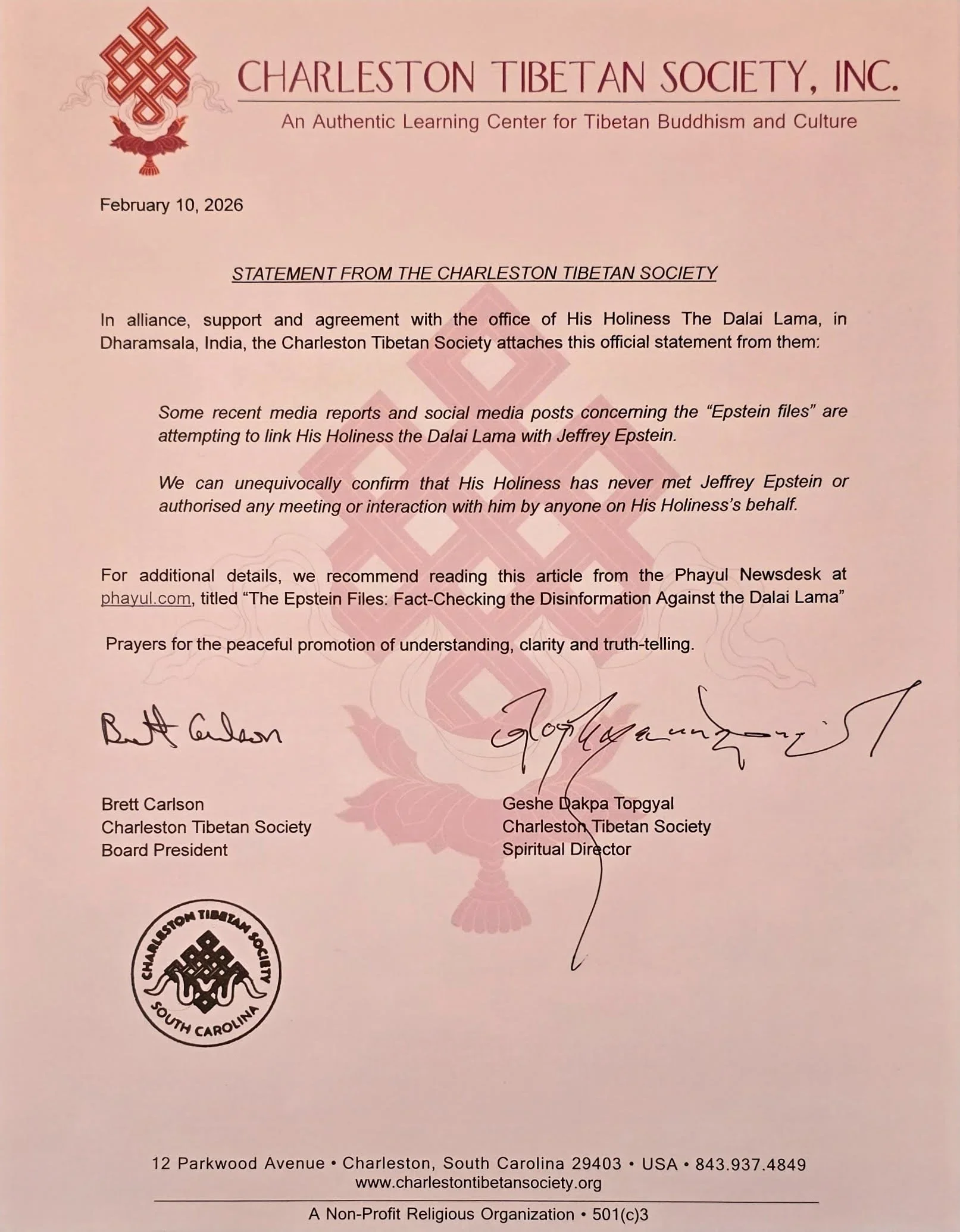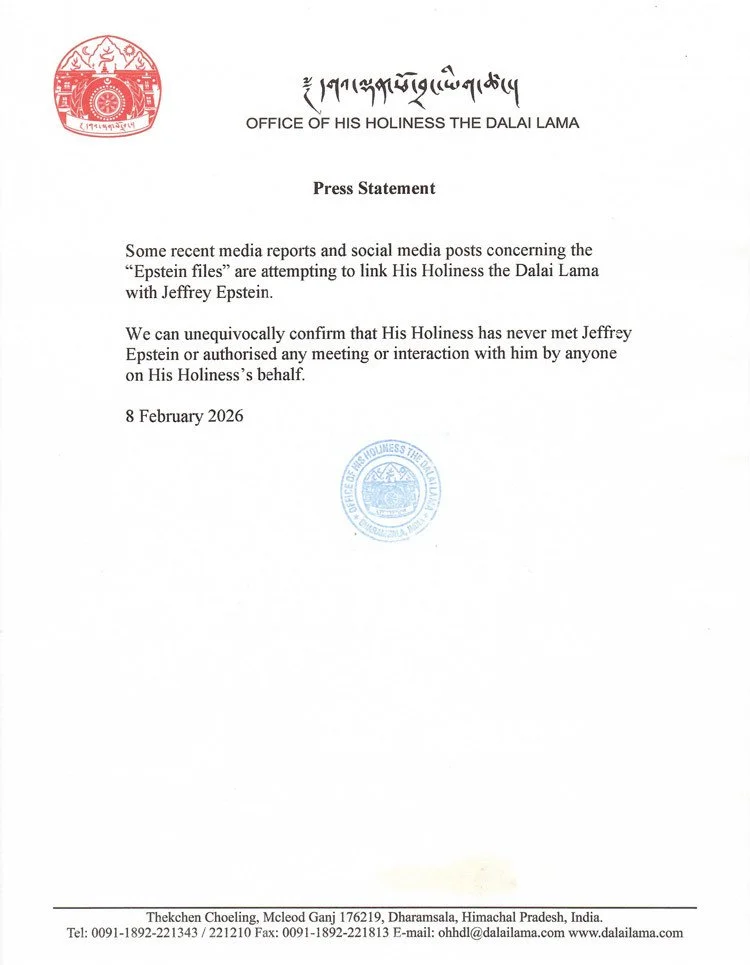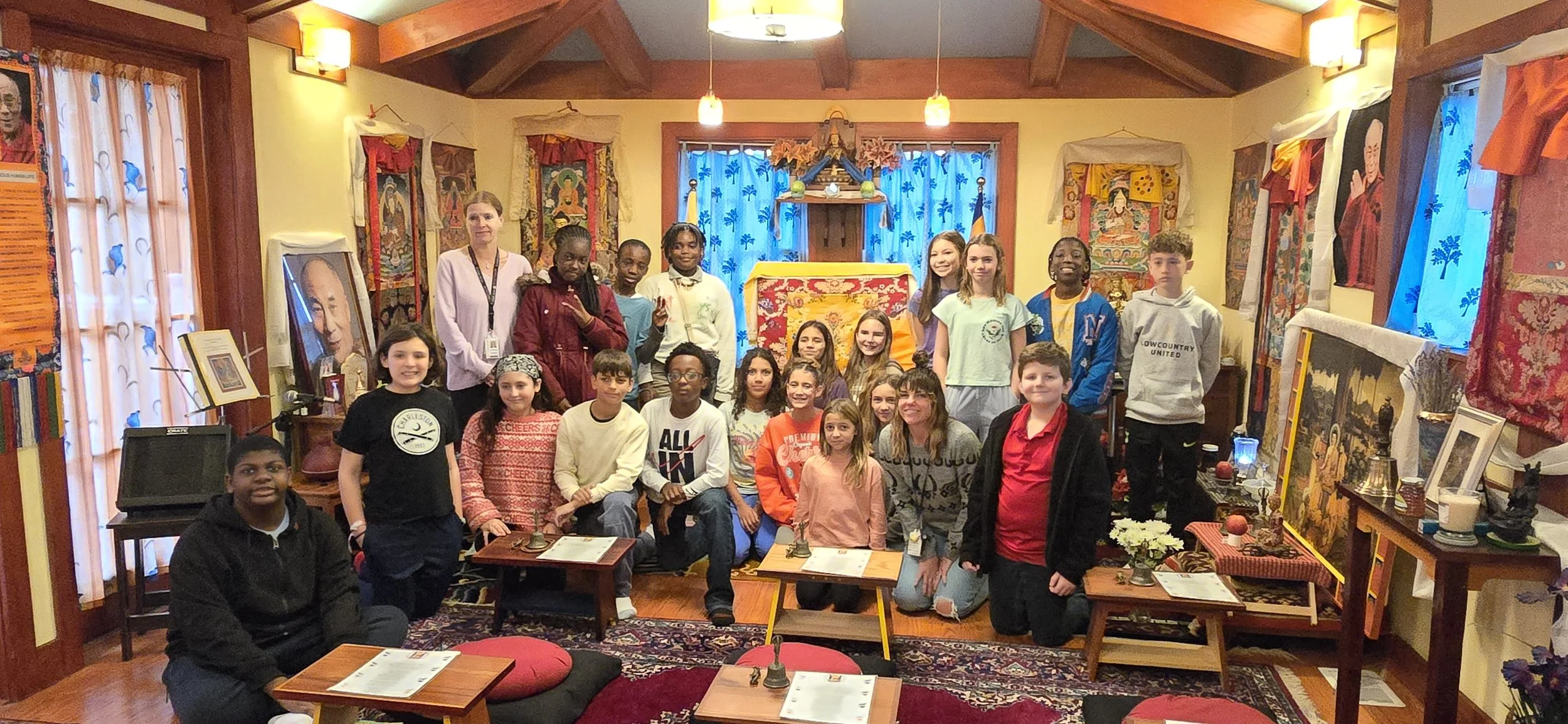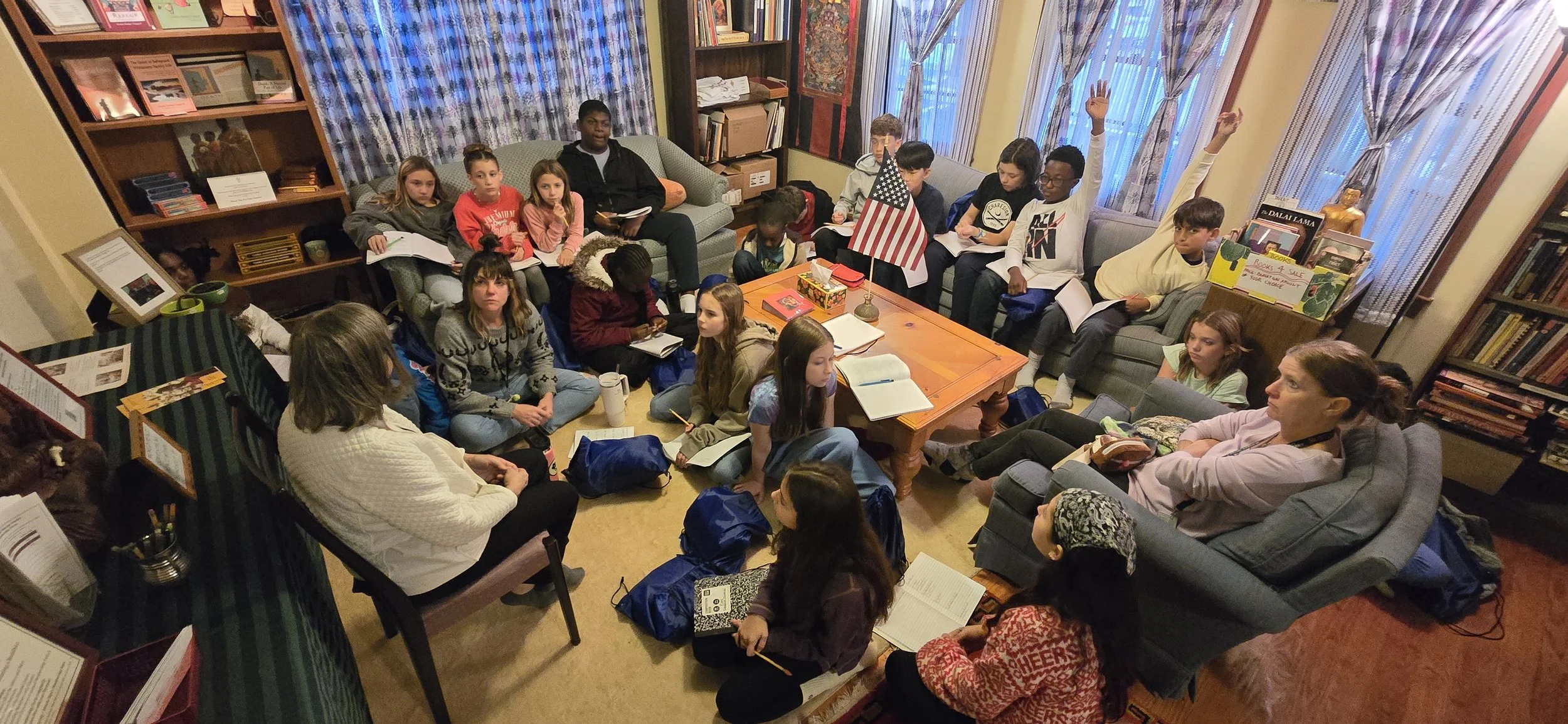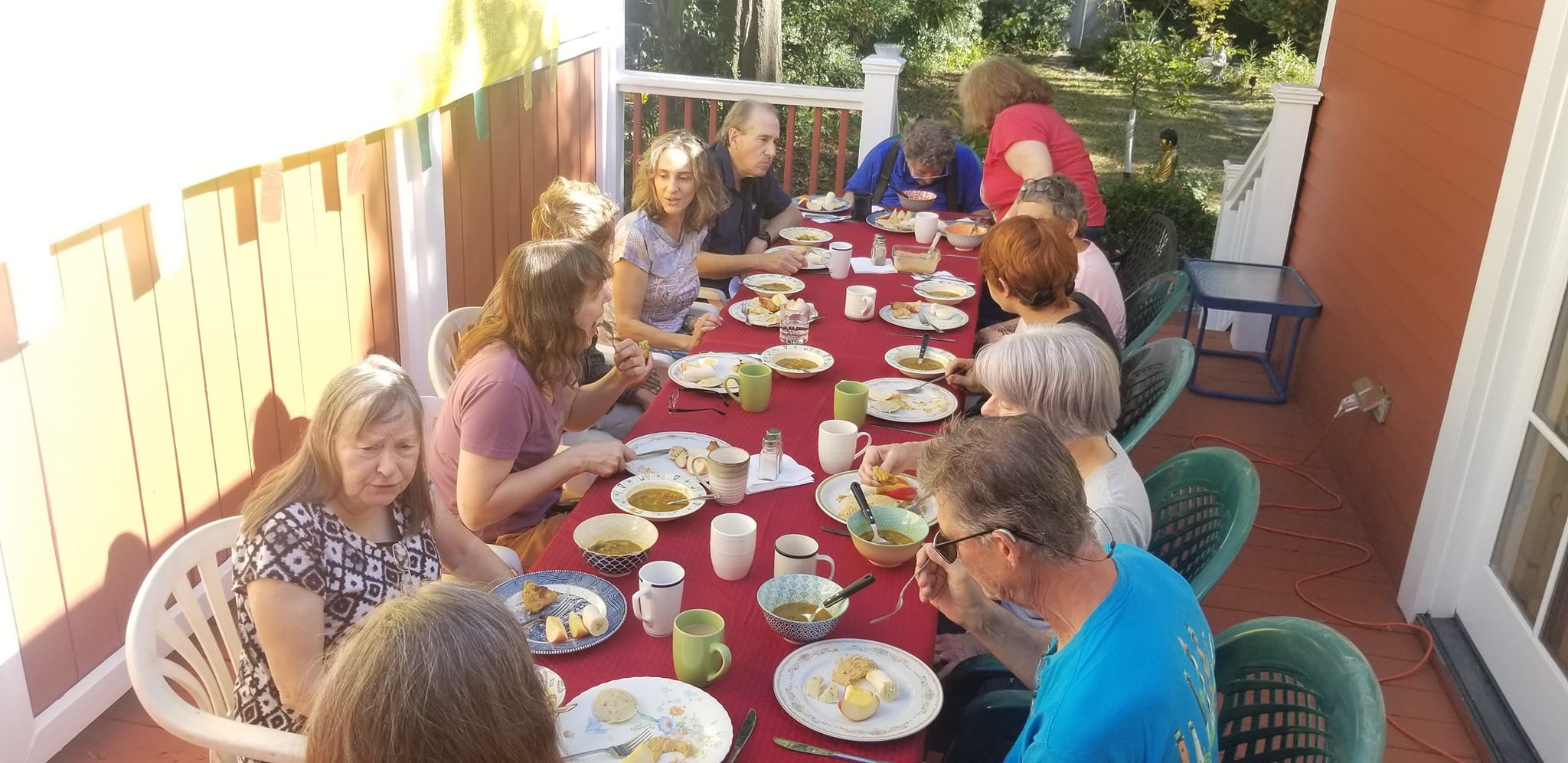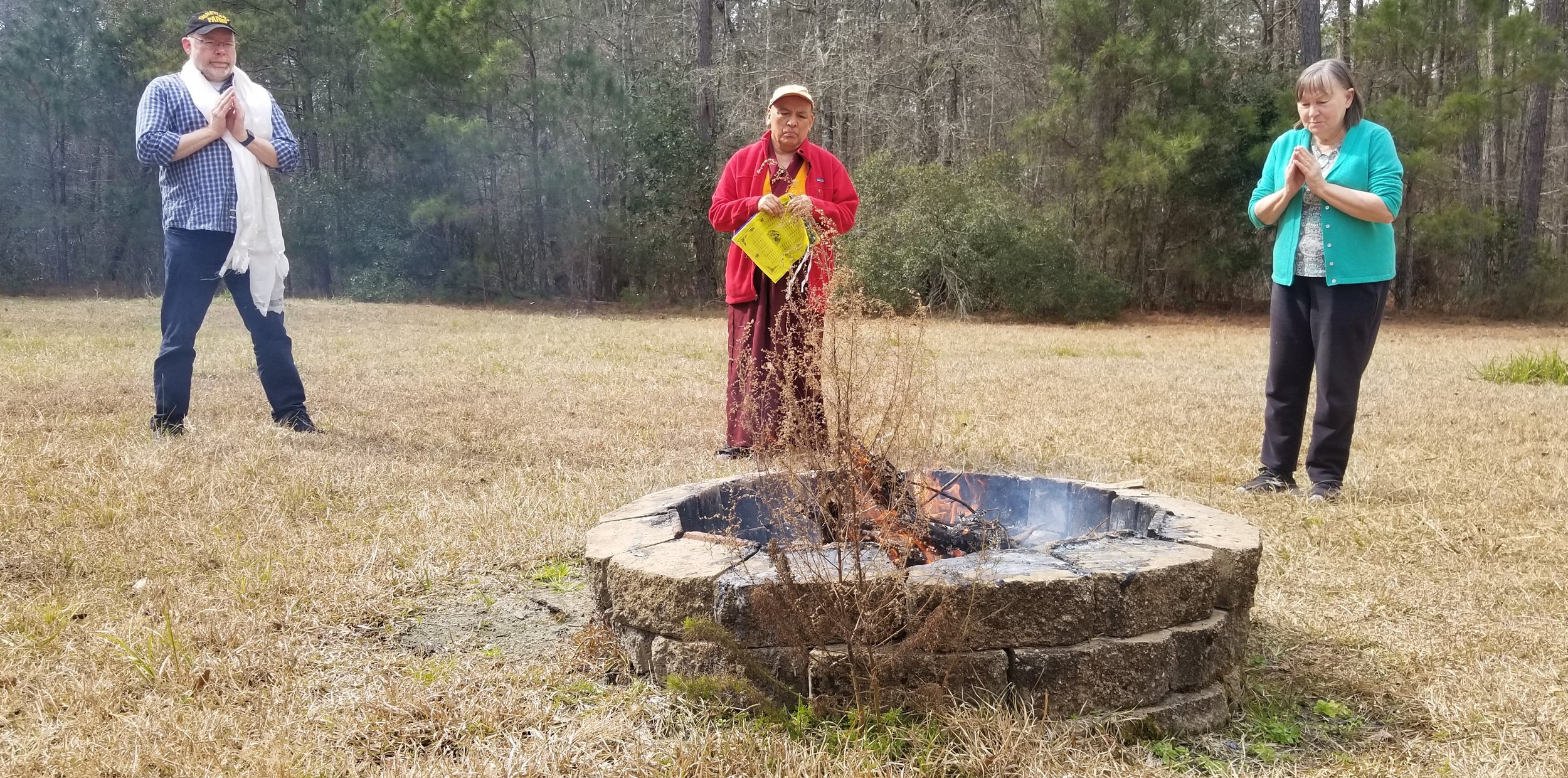SPECIAL EVENTS
We are accepting food donations for our eastside neighbors at the Neighborhood House (77 America St) who will appreciate canned soups/stews (not cream of), canned meat, canned fruits, canned vegetables, pasta, rice, and 12oz bottled water as well as personal hygiene items such as soap, shampoo, toothpaste & deodorant. Offerings can be placed in foyer at Dharma Center. Sincere thanks to those who have already contributed. Geshe-la’s short stanza on giving:
The real value of wealth lies within the act of giving.
The value of wealth is ruined in miserliness when one fails to act generously.
Upcoming Events: .
The Dharma Center is regularly open for in person teachings on meditation on sunday’s at 8:30-9:30am, and the stages of the path or Lam Rim on Monday’s at 6 -7pm. everyone is welcome to join!
February 18-20 Losar, the Tibetan New Year 2153, marks a time of renewal, purification, and fresh intention. Traditionally, it is a moment to clear away the old—both outwardly and inwardly—and to welcome the new year with clarity, generosity, and joy.
CTS will be observing this important time of the year from February 18-20. During these days, we will be preparing for the New Year by tidying and refreshing the center. This is a simple but meaningful way to practice mindfulness, care for our shared space, and support the Sangha. Even a little time helps, and many hands make light work.
Saturday, February 21 @ 12 Noon: LOSAR CELEBRATORY POTLUCK: We welcome you to join us for a potluck lunch on Saturday, February 21 at noon. This will be a relaxed and joyful opportunity to gather, share food, and welcome the New Year together as a community. Whether you’re able to help with cleaning, join the potluck, or simply hold the intention of renewal, your presence and participation are deeply appreciated. Losar reminds us that community itself is part of the practice. Here’s some previous Losar experiences…
Tuesday, March 10 Tibetan Uprising Day: 1959 Anniversary
Saturday, March 14 @ 12 noon: Sangha Social Movie: We’ll be showing a short film/documentary in remembrance of Tibetan Uprising Day
RECENT EVENTS:
February 13, 2026: The CTS hosted A+ World Academy, a school aboard the Norwegian tall ship Sørlandet. They sail around the Atlantic while high school students take classes & At every port they organize learning opportunities and activities for the students to learn more about the local culture. Geshe-la shared with them information about Tibet, Tibetan culture, Tibetan Buddhism as well as Meditation that they can use wherever they are: whether in the middle of the ocean or on firm ground. As a humble gift, we shared Tibetan Prayer Flags with them & as well as prayers for safe travels.
February 10, 2026: The CTS & Geshe-la hosted several seniors from Ashley Hall, as well as their teacher, Chris Hughes (far left). Rylee Keevil (left of Geshe-la) is enrolled in a year long senior project allowing her to explore a topic she’s passionate about, and her guiding question has been: How do we find meaning in life, and how does that meaning benefit our overall well-being? Rylee is interested in Buddhist practices that foster self-understanding, mindfulness, and inner peace, particularly the ways meditation can help cultivate awareness, reduce anxiety, and strengthen the connection between mind and body.
February 10, 2026: the CTS Board & Geshe Dakpa Topgyal stand with His Holiness the Dalai Lama and release the following statement:
In alliance, support and agreement witht he office of His Holiness the Dalai Lama, in Dharamsala, India, the Charleston Tibetan Society attached this official statement from them:
Some recent media reports and social media posts concerning the “Epstein files” are attempting to link His Holiness the Dalai Lama with Jeffrey Epstein.
We can unequivocally confirm that His Holiness has never met Jeffrey Epstein or authorized any meeting or interaction with him by anyone on His Holiness’s behalf.
For additional details, we recommend reading this article from the Phayl Newsdesk at phayul.com, titled “The Epstein Files: fact-Checking the Disinformation Against the Dalai Lama.”
Prayers for the peaceful promotion of understanding, clarity & truth-telling.
Geshe Dakpa Topgyal, Spiritual Director
Brett Carlson, Board President
February 8, 2026: Office of His Holiness the Dalai Lama press statement:
Some recent media reports and social media posts concerning the “Epstein files” are attempting to link His Holiness the Dalai Lama with Jeffrey Epstein.
We can unequivocally confirm that His Holiness has never met Jeffrey Epstein or authorized any meeting or interaction with him by anyone on His Holiness’s behalf.
8 February 2026
Sat, Jan 17 Savory Sangha Social Lunch: Maike Kowal humbly prepared a Moroccan Stew with chicken or vegetables served in bowls she too created. Geshe-la’s shared his delicious savory chai as well that went well with dessert. A nice gathering amongst friends.
tues , Dec 2 James Simons Montessori school 6th Graders: We hosted our young neighbors from Ms. Jessica’s 6th grade class who walked to the Dharma Center to learn more about Tibet, its unique ancient culture as well as Buddhist philosophy and its founder, Buddha Shakyamuni. The curious students enthusiastically asked many questions of Cathy Funderburk & Brett Carlson including some significant ones, such as “what happens after death?”. We also shared a tour of the shrine room including a description of some of the thangka wall paintings and altar objects.
Saturday, Nov 15: Sangha Social Get Together @ Dharma Center
Sunday, Oct 19: Sangha Social dolphin cruise from Isle of Palms Marina. We offered this special dolphin Eco~Tour boat cruise through the tidal salt marsh where we experienced pods of dolphins as well as many species of birds including migratory white pelicans & local egrets, herons & oyster catchers.
Sunday, July 6: His Holiness the Dalai Lama’s 90th Birthday Celebration: long life prayer ceremony & vegetarian Potluck
Brett read a message by His Holiness the Dalai Lama for His 90th Birthday:
On the occasion of my 90th birthday, I understand that well-wishers and friends in many places, including Tibetan communities, are gathering for celebrations. I particularly appreciate the fact that many of you are using the occasion to engage in initiatives that highlight the importance of compassion, warm-heartedness, and altruism.
I am just a simple Buddhist monk; I don’t normally engage in birthday celebrations. However, since you are organizing events focused on my birthday I wish to share some thoughts.
While it is important to work for material development, it is vital to focus on achieving peace of mind through cultivating a good heart and by being compassionate, not just toward near and dear ones, but toward everyone. Through this, you will contribute to making the world a better place.
As for myself, I will continue to focus on my commitments of promoting human values, religious harmony, drawing attention to the ancient Indian wisdom which explains the workings of mind and emotions, and Tibetan culture and heritage, which has so much potential to contribute to the world through its emphasis on peace of mind and compassion.
I develop determination and courage in my daily life through the teachings of the Buddha and Indian masters such as Shantideva, whose following aspiration I strive to uphold.
As long as space endures,
As long as sentient being remain,
Until then, may I too remain
To dispel the miseries of the world.
Thank you for using the opportunity of my birthday to cultivate peace of mind and compassion.
Tashi Deleg and with prayers,
Dalai Lama
Brett also read an important statement by His Holiness the Dalai Lama’s‘Statement Affirming the Continuation of the Institution of Dalai Lama’ :
On 24 September 2011, at a meeting of the heads of Tibetan spiritual traditions, I made a statement to fellow Tibetans in and outside Tibet, followers of Tibetan Buddhism, and those who have a connection with Tibet and Tibetans, regarding whether the institution of the Dalai Lama should continue. I stated, “As far back as 1969, I made clear that concerned people should decide whether the Dalai Lama’s reincarnations should continue in the future.”
I also said, “When I am about ninety I will consult the high Lamas of the Tibetan Buddhist traditions, the Tibetan public, and other concerned people who follow Tibetan Buddhism, to re-evaluate whether or not the institution of the Dalai Lama should continue.”
Although I have had no public discussions on this issue, over the last 14 years leaders of Tibet’s spiritual traditions, members of the Tibetan Parliament in Exile, participants in a Special General Body Meeting, members of the Central Tibetan Administration, NGOs, Buddhists from the Himalayan region, Mongolia, Buddhist republics of the Russian Federation and Buddhists in Asia including mainland China, have written to me with reasons, earnestly requesting that the institution of the Dalai Lama continue. In particular, I have received messages through various channels from Tibetans in Tibet making the same appeal. In accordance with all these requests, I am affirming that the institution of the Dalai Lama will continue.
The process by which a future Dalai Lama is to be recognized has been clearly established in the 24 September 2011 statement which states that responsibility for doing so will rest exclusively with members of the Gaden Phodrang Trust, the Office of His Holiness the Dalai Lama. They should consult the various heads of the Tibetan Buddhist traditions and the reliable oath-bound Dharma Protectors who are linked inseparably to the lineage of the Dalai Lamas. They should accordingly carry out the procedures of search and recognition in accordance with past tradition.
I hereby reiterate that the Gaden Phodrang Trust has sole authority to recognize the future reincarnation; no one else has any such authority to interfere in this matter.
Wednesday, June 11: Saga Dawa Ceremony on Full Moon
Buddha Shakyamuni
HOLY MONTH of SAGA DAWA
Monday, May 26 thru Wednesday June 25, 2025
Culminating on Full Moon Wednesday, June 11
Saga Dawa is a holy month for millions of Buddhists around the world. It is the month in which Shakyamuni Buddha was born, attained enlightenment, and passed into Nirvana. These 3 sacred events occurred on the full moon of the same month and are considered to be the 3 most sacred events of the historical Buddha's life on Mother Earth.
Saga Dawa will start from Monday, May 26, culminating on the full moon on Wednesday, June 11 then waning back to the new moon on Wednesday June 25. The entire month of Saga Dawa is a great opportunity to accumulate merit due to the sacredness of the month and the magnification of the karma created, and so it is a special time to expand your compassion and generosity. A great way is to save sentient beings that would otherwise be killed thru purchasing and then releasing them in a safe and conducive habitat. Fiddler crabs and worms can be purchased at your local fishing tackle store and then released conducive habitats. Fiddler crabs should be released into tidal salt marshes and worms into your yard where you regularly see worms as not all soils are conducive as well as gardens where digging is likely to occur. Mantras to be recited when releasing can be found below.
Some examples of practices and meritorious deeds that you can do are: 1. Prostrations 2. Mandala Offering 3. Making attractive & colorful material offerings of fresh flowers, candle lights, fragrant incense, fresh and scented water offering before the enlightened beings 4. Giving material help of food, drink, clothing, and medicine to the poor & needing ones 5. Releasing lives 6. Abstaining from eating meat and alcohol 7. Observing celibacy 8. Meditating and putting effort to do intensive spiritual practices of Love, Compassion, meditation, purification and Tong-Len (Giving & taking) Practice
Here's a purification practice that Geshela advises we do each day until Saga Dawa culminates on the full moon on Wed, June 11.
Whatever negative actions I may have committed,
Under the control of my deluded mind,
I shall purify them with regret and resolution,
Before the enlightened beings as eyewitnesses.
(repeat 3 times)
OM VAJRASATTVA HUNG PHED !
(100 times or more)
A great way to accumulate merit is by supporting the Dharma to flourish by donating to: 1) the Operational Fund facilitating the functioning Dharma Center so Buddha's teachings can flourish, or 2) the Radiant Mind Retreat Center
The purification of negativities conjoined with the accumulation of merit is an amazing way to make the most of this precious opportunity to enhance your practice by giving your best effort, turning better into best, especially on the full moon day of Wednesday June 11!
Below is a Short Introduction to the Sacred Month of Saga Dawa including a list written by our Spiritual Director & Resident Teacher, Geshe Dakpa Topgyal, of the Exceptional Things One Should DO & NOT do during the Holy Saga Dawa.
WHAT EXCEPTIONAL THINGS SHOULD ONE DO DURING THE HOLY SAGA-DAWA
Stay away from eating meat.
Stay away from mowing the grass, since it may kill many insects.
Stay away from digging the earth, since it may kill many insects.
Stay away from anger and other negative thoughts.
Stay away from doing harm to others, even very minor things.
Do less agitation to things in nature, such as to the earth, plants, trees, etc.
Limit your idle chitchat.
Give yourself more time to do practice, such as reading Dharma books, reciting mantras and prayers, meditation, contemplation, reflection of the true nature of life, and listening to the Dharma teachings, etc.
Make material offerings before the inspiring images of enlightened beings out of devotion, respect, humility, and admiration.
Do generosity out of love and compassion.
Save the lives of creatures by releasing them from the hands of fishermen and butchers.
Pay deep and fresh respect to the Buddha and motivate yourself to become like him.
Make merit through performing good deeds.
Do virtue in all your thoughts and actions.
Dedicate all of your virtue and merits solely for the cause of enlightenment.
Do reflection on emptiness and the law of dependent origination with a deep wish for yourself to gain quick realization of emptiness.
The following mantras should be recited when releasing :
A) LONGEVITY MANTRAS FOR FREEING LIFE:
VIJAYA BUDDHA MANTRA: OM DRUM SO HA ! OM AH MEE TA AH YU DHA DEY SO HA ! ( recite 7 times )
AMITAYUS BUDDHA MANTRA: OM AH MA RATNA ZEY WEN TAY YEH SO HA ! ( recite 7 times)
WHITE TARA MANTRA: OM TA REY TUTA REY TU REY / MA MA AH YU / PU NEY JNANA / PU TRIN KU RU / YEH SO HA! ( recite 7 times )
B) MANTRA OF BUDDHA MEE-TRUG PA:
OM NAMO RATNA TRA YA YA ! OM KUNG KANA KUNG KANA !
RO TSA NA RO TSA NA ! TRO TRA NA TRO TRA NA !
TRA TI HA NA ! TRA TI HA NA ! SAWA KAMA PARI PARA !
NEY NEY SAWA SITI ! NEY TSA YEH SO HA ! ( recite 3 times )
C) DEDICATION: One must recite the dedication prayers while deeply reflecting on its meaning.
SEM CHEN NEY PA JEE NYIH PA
NYUR DU NEY LEH THAR GYUR CHIK
DRO WEY NEY NEE MA LU PA
TAK DU JUNG WA MEY PUR SHOK !
May all who are sick and ill
Quickly be freed from their ailments.
Whatever diseases there are in the world
May they never occur again
YANG PEY GYAM KAM KUN TU SA CHOK DIR
NEY MUK TRUK TSO LA SOK MI JUNG SHING
DRO NAM CHO JOR DEY KYID TSO WA DANG
PUN TSOK PEL JOR LEH TSOK GEY GYUR CHIK !
May there be no illness, dispute, or war
At all existing levels, from home to the Universe
May everyone experience joy, peace and spiritual splendors
May the glory and riches of goodness ever increase
RANG DON DRUB LA NAM YANG MEY REY SHING
SHEN DON BHA SHIK DRUB LA SHOL WA DANG
CHEN DANG NYON SHEY MA KAY ZOPA SOK
SHEN DON JEY PAY KEN NAM TSANG VAR SHOK !!
May I never dwell on the desire to fulfill my own interest,
May I solely strive for the benefit of others,
May all necessary ways to benefit others such as wisdom eyes, clairvoyance, skillful ways to speak, patience and so forth,
May I possess all of these benefiting qualities quickly.
A SHORT INTRODUCTION TO THE SACRED MONTH OF SAGA-DAWA
Saga-Dawa is a holy month for millions of Buddhist devotees around the world. It is the month in which Shakyamuni Buddha was born, attained enlightenment, and passed into Nirvana. These three events occurred on the same month of the same day of a full moon. They are considered to be the three most sacred and greatest events of the historical Buddha’s life on mother earth.
Shakyamuni Buddha was born in India at Lumbini Park at Kapilavatthu 2,600 years ago into the royal family of the Shakya clan. On the fifth day after the prince’s birth, he was named Prince Siddhartha, or Shonue Dhondup in Tibetan, which means “wish-fulled”.
His father’s name was King Suddhodana, which means “pure generosity”. His mother’s name was Queen Mayadevi, which means “magical goddess”. Buddha’s beloved mother died seven days after giving birth. However, her younger sister, Prajapati married the king in the best interests of the infant Prince Siddhartha. She adopted the child, entrusting him as her own son and nursed him by all means with love and affection.
In accordance with the ancient Indian custom, eight highly learned Brahmins were invited to the palace for the naming ceremony. After carefully examining the characteristic marks and signs of the prince, seven of them raised two fingers each, indicative of two alternative possibilities. They said that the prince would either become a universal monarch or a supreme spiritual teacher. One among the eight yogis doubtlessly declared that the prince would definitely renounce the world and would become a Buddha, a fully enlightened or awakened spiritual teacher.
After examining the marks on the prince, the royal family was really frightened by the yogi’s declaration, thinking that their son would not succeed in taking the lineage of the Shakya clan royal family. His father used all possible means to shield the prince from catching sight of any of the miseries of the world. The father built three lotus ponds: one blue, one white, and one red for his son’s enjoyment. Three palaces were also built for him by his father, one for the cold season, one for the hot season, and one for the rainy season.
His father gathered 500 hundred beautiful young girls (similar to cheerleader girls) in order to please the prince. The young girls’ jobs were to dance, sing, tell stories, read poetry, give massages, give baths, take walks around the palace compound, and make constant eye contact with gentle smiles and winks to the prince. The king did this in an effort to shield the prince from going out from the palace compound, where he could catch sight of the miseries of the world. His father worried that this could cause him to renounce the world and seek the truth of what really leads to pain and suffering among mankind.
Prince Siddhartha was educated at home in the palace. He studied inner science, Hindu philosophy, various rituals, arts, music, and the art of warfare. At the young age of 16, he married Princess Yashodhara, who was the same age. For nearly 13 years of a happy marriage, he led a luxurious life. The couple had a son, named Rahula, the name given by his grandfather. Day and night, a white parasol was held over Prince Siddhartha’s head so that heat, cold, dust, leaves, or dew might not touch him. However, Prince Siddhartha never found any satisfaction in his father’s luxurious great palaces. He was very drawn to compassion and curiosity about the conditions of the world outside the gates of his palaces.
His deep contemplative and boundless compassionate nature did not permit him to spend his time in the mere personal enjoyment of the fleeting pleasures of the royal palace life. He knew no personal grief, but he felt a deep compassion for the suffering of humanity. Amidst comfort and prosperity, he realized the universality of sorrow.
After going out of the gates of his palaces, he witnessed that all beings are subject to karmic birth, sickness, aging, sorrow, imperfections, and death. Birth has no room for happiness, but only torment. Birth is painful. Life is fragile. Because of karma, death is unavoidable, and rebirth is necessary in the subsequent moment of death. Prince Siddhartha came in direct contact with the stark realities of life.
On his way home, he saw a homeless man who seemed relatively happy, content, serene, and abiding in equanimity. It inspired him and he became hopeful and optimistic that there should be a remedy for the sufferings of humanity. This increased the urge in him to loathe and renounce the world. Finally, Siddhartha decided to leave the palace in search of truth and eternal peace.
Siddhartha left the palace on one dark midnight while his wife and son were in a deep sleep. He gave his last loving kiss on the cheek to his wife and infant son, thinking that they would never be lacking of anything in their lives. They would have all the needed support from his parents. He was not worried about the future worldly happiness and comfort of the mother and child, as they had everything in abundance and were well protected. He was 100% sure that he could play a more important and beneficial role than a dutiful husband and father, or even as a king of kings. It was not that he loved them less, but that he loved humanity more.
He ordered his loyal charioteer, Channa, to saddle the horse and went to the suite of apartments occupied by the princess. Opening the door of the chamber, he stood on the threshold and cast his dispassionate glance on his wife and child who were in a deep sleep. Great was his love for the two dear ones at this parting moment. Greatest was his compassion for the suffering of humanity. He left everything behind. Alone and penniless, he set out in search of the truth.
Siddhartha renounced the world. But in was not the type of renunciation of an old man who has had his fill of the worldly life. It was not the renunciation of a poor man who has nothing to leave behind. It was the renunciation of a prince in full bloom of youth, with plentiful wealth and prosperity – a renunciation unparalleled in history. It was in his 29th year that Prince Siddhartha made this historic journey.
He journeyed far and, crossing the river Anoma, rested on its banks. There he cut his hair and shaved his beard, and handed over his garments and ornaments to Channa, with instructions for Channa to return to the palace. Siddhartha assumed the simple yellow garb of an ascetic, and led a life of voluntary poverty.
The ascetic Prince Siddhartha, who once lived in the lap of luxury, became a penniless wanderer, with no permanent abode. A shady tree or a lonely forest sheltered him by day and by night. Bare-footed and bare-headed, he walked in the scorching sun and in the piercing cold. With no possessions to call his own, except for a bowl to collect food and robes just sufficient to cover his body, he concentrated all of his energy on the quest for the truth.
Ascetic Prince Siddhartha met five other Hindu ascetics in that lonely forest and joined them. After some time living together, Siddhartha was not happy with the practice and discipline that he was doing with the other five ascetics. He found out that the practice was none other than self-mortification. Weakening the body only weakens the mind and its natural clarity. So, he made a decision to leave the practice and discipline with them and he moved to another place of solitude where he remained in deep meditation. His body was already very weak and fragile owing to the practice of self-mortification with the five ascetic friends.
One day, a young village girl saw him sitting in deep meditation and discovered that he was extremely weak and fragile. The girl then offered him a bowl of rice and some milk. The ascetic Prince Siddhartha ate the rice and drank the milk. As a result, he regained his physical strength and his mental energy and clarity of mind. In subsequent time, he found the Middle Path, which was neither extreme indulgence nor total rejection.
His five ascetic friends saw that Siddhartha ate the rice and drank the milk. They were very upset, thinking that he had behaved sinfully and had broken his vows, which made him unworthy of the ascetic practice.
After regaining his mental and physical strength, he made a firm determination to remain in deep meditation underneath the Bodhi tree in Bodh-Gaya. He promised that he would not remove himself from his lotus seating position until he attained full enlightenment. After six years of sitting in intense and deep meditation, at the age of 35, Prince Siddhartha finally attained enlightenment – on the 4th Lunar month on the full-moon day – the day he was also born. He attained enlightenment on that day at dawn by defeating the five Maras simultaneously, with the two subtlest obstructions – the obstruction to liberation and the obstruction to omniscience.
Since then he was referred to as a Buddha or an awakened one. The historical Shakyamuni Buddha was no longer referred to as Prince Siddhartha. He became a supreme spiritual teacher while remaining a human and not a God or Divine being. However, he did not give a teaching for 45 days after attaining enlightenment, thinking that others may not be able to understand what he had to teach them. He remained in silence for 45 days. However, on the 46th day, his compassion allowed him to come out into the world in order to teach the way to virtue and the path to ultimate happiness.
The historical Shakyamuni Buddha gave teachings for 46 years for the best interest of humanity. His teachings are not dogma, and they have no room for blind faith or blind practice. His teachings are called Dharma, which means “one that brings inner transformation”.
He gave two levels of teachings, Sutrayana and Tantrayana. Sutrayana is exoteric teaching and Tantrayana is more esoteric teaching. The entire teachings of the Buddha come under three categories: morality, meditation, and wisdom. Morality is a necessary spiritual foundation. Meditation is a necessary tool for realization. Wisdom is a necessary eye to see the truth of reality in order to cut the root of samsara and go to the other side of the shore to enlightenment.
Shakyamuni Buddha gave his first teaching in Deer Park, Varanasi to his five former ascetic friends, on the theme of the Four Noble Truths. The Four Noble Truths actually form a strong foundation of Buddha’s teachings.
Before opening his formal teachings to the public, he made very sure to explain that he is not a God, but a human teacher. Buddha said: “Do not see a divine being in me. I am not a God. I am here only to teach about the path that I Myself have travelled to attain enlightenment. I teach only what I know. I teach only what you need. I teach only through my personal experience and knowing. I do not teach things that I do not know and things that you do not need though you may want me to”.
Similarly, the Buddha wanted to make sure that his teachings do not require faith and do not need to be accepted in order to find the truth of his teachings. The Buddha openly discouraged his followers to not place blind faith or acceptance out of reverence in the Buddha.
The Buddha said: “Oh…monks, nuns, scholars, and other followers. Do not accept my teachings out of faith or mere reverence to me. Rather, one should examine my teachings thoroughly like a goldsmith examines the purity of his gold through rubbing it, cutting it, and burning it. Once you have found the truth in my teachings, then only should one accept them and put them into real practice”. At the end, the Buddha said: “I am not a savior. I am not a punisher. I am not a rewarder. But I am just a teacher and I am here to teach. One should know that the enlightenment is within your own hand”.
After giving extremely broad and extensive teachings for 46 years during his lifetime, Shakyamuni Buddha chose, at the age of 81, to dissolve his physical body from the eyes of the world on the same full moon day and in the same month as his birth and attainment of enlightenment. The whole purpose of his physical dissolution was to demonstrate that life is impermanent. He also wanted to motivate the world to extract the essence of life through practicing the Dharma.
Shakyamuni Buddha predicted that his teachings would last for 5,000 years and remain effective for humanity. 2,600 years have already passed, with 2,400 years remaining for his teachings to be alive and remain as effective as they were before.
Prior to Buddha’s passing away into Parinirvana, his students requested him to give clear instructions on who should succeed him or should be appointed in his place. The Buddha replied: “No one should be appointed in my place and there is no need of it. My teachings on Vinaya or morality should be treated as your teacher”. These words were the last words of the Buddha. The Buddha utterly went into silence for a few days and finally passed away by dissolving his gross physical body from the world’s eye
May 26 - june 25: holy month of Saga Dawa
Friday June 20: Sangha Social: Dolphin Sunset Boat Tour: We enjoyed a Dolphin~Solstice Sunset Boat Cruise through the tidal salt marsh where we experienced a large pod of dolphins in their natural environment, and enjoyed the solstice sunset!
Wednesday june 11: Saga Dawa Ceremony on Full Moon
we shared a candlelight offering, a biography of Buddha Shakyamuni, Geshe-la recited the prayer “In Praise of the 12 deeds of the Buddha” as well as mantras including Buddha Shakyamuni's, Medicine Buddha's & Amitayus Longevity. We closed with a final dedication then released worms in the backyard.
Sat Apr 26 Sangha Social Pancake Breakfast: we shared a delicious pancake breakfast served with a variety of fruit toppings, sausage as well as Geshe-la’s delicious & nutritious chai & OJ. Many thanks to those that volunteered to make it go so well especially our chef David Laurell.
Sat Mar 18: 3rd Saturday Sangha Social: Movie “Expelled from the Top: A Story of Tibetan Refugees” We are shared this in remembrance of Tibetan National Uprising Day (March 10), and the reality 70 years later for Tibetan refugees. Expelled from the Top is a 2023 documentary including interviews with His Holiness the Dalai Lama, follows the Tibetan Refugees in Dharamsala, the Capital for the Central Tibetan Administration nestled in the foothills of the Himalayas, as well as Mundgod, in Southern India where Geshe-la went to the Drepung Loseling Monastery.
Mon Mar 10, 2025: 66th Tibetan National Uprising Day : We shared info on His Holiness the Dalai Lama’s Middle Way Approach for resolving tibet’s issue, recited Peace Prayers composed by His Holiness & Geshe-la, then meditated before reciting Mantras for all sentient beings Here’s a link to description of the Tibetan flag’s symbolism
Sat Mar 1 @ Noon: Losar celebration potluck
Sat Feb 15@ 3-4:30pm 3rd Saturday Sangha Social: Movie “Dalai Lama: The Soul of Tibet”. With the upcoming Tibetan New Year as well as National Uprising Day on March 10, we are offering this 45 minute documentary (1997) to raise awareness of His Holiness the Dalai Lama & his life’s experience from being recognized as The Dalai Lama as a young boy, becoming tibet’s leader, then having to escape tibet finding refuge in The Buddha’s homeland of India.
Mon Feb 3: We welcomed Dr. Tsai’s class from The Citadel that includes a section on Tibet, and are glad to be able to share with our neighbors. Geshe-la shared some info on Tibet and its unique & distinct 6,000 year old history (from China). Unique in the sense of having a firm grounding of morality rooted in compassion and not necessarily the best. Geshe-la also shared about the plight of the 6 million Tibetans living in Tibet when the Communist Chinese Party (CCP) initially invaded Eastern Tibet in October 1950 and started a cultural revolution. Soon after, the CCP started constructing roads that would eventually lead to Lhasa, Tibet’s capital by 1958/59. In March 1959, His Holiness the Dalai Lama fled Tibet over the Himalayas to find exile in India, and 80,000 Tibetans followed him there while around 1.2 million Tibetans would die as consequences of the Chinese invasion. In 1966, Chairman Mao launched another attack to purge Tibet of the “4 olds”: old ideas, old culture, old customs & old habits. Geshe-la encouraged the cadets to search for happiness within themselves and that they actually have a responsibility to do so, as well as to diligently search for ones own faults before placing faults on others, After Geshe-la’s talk, he shared his delicious chai with them.
Wed Dec 25: Lama Tsongkhapa Day: Je Tsongkhapa Lobzang Drakpa (1357 - 1419) also known as Je Rinpoche is the founder of the Gelug tradition of Tibetan Buddhism & this date celebrates his passing into parinirvana. Je Tsongkhapa was born in Tsongkha valley of the Amdo region in northeastern Tibet. A couple days before, Geshe la shared prayers & blessings with local mongolians devotees while paying humble respect to enlightened beings.
Sat Dec 14: 3rd Saturday Sangha Social: Special Holiday celebration Lunch prepared by Bernadette Cali Leland.
Sun Nov 24 & Mon Nov 25 Geshema Tenzin Choyang (below on right) was our guest teacher & presenter. She is from the Jangchub Choeling Nunnery in southern india near Drepung Loseling Monastery where geshe-la attended. As one of only 73 female Tibetan Buddhist monastics to have attained the Geshe degree since it was opened to them by His Holiness the 14th Dalai Lama in 2016, Geshema Choyang is a leader within her monastic community. She is spearheading a Library & Learning Center project at her nunnery to benefit the nuns as well as local Tibetan women and Western women who would like to study Tibetan Buddhism.
Sat Nov 16 3rd Saturday Sangha Social: a casual gathering at dharma center & opportunity to learn more about the cts organization, its projects, meditation or buddhism, and an opportunity to commune with others.
~> Sat JULY 6 @ 4PM - 5:30: His Holiness the Dalai Lama’s 89th Birthday Celebration (90th per tibetan lunar calendar) & POTLUCK. Long Live His Holiness the Dalai Lama!!! We had a ceremony including long life prayers, reciting mantras & released over 200 worms in the backyard. After the ceremony we shared a healthy & savory Potluck including veggie momos from a tibetan couple living in charleston area.
His Holiness the Dalai Lama addressing the congregation during the Long Life Prayer at the Main Tibetan Temple in Dharamsala, HP, India on June 11, 2024. Photo by Tenzin Choejor
Geshe-la praying for more than 200 worms before setting them free in the Dharma Center's backyard.
It's his 90th per the Tibetan Lunar calendar on the 5th day of the 5th month while only 89 per our Western calendar. On June 11th, a long-life ceremony was conducted at his residence in Dharamsala where he shared the following:
His Holiness shares the best gift you can give him is your practice of compassion & to invoke such we can recite
1,000 Mantra recitations of The Buddha of Compassion: OM MANI PADME HUNG
Long Life Prayers for His Holiness the Dalai Lama
In the land encircled by snow mountains,
You are the source of all happiness and good;
All-powerful Chenrezig, Tenzin Gyatso,
Please remain until samsara ends.
Some other compassionate opportunities:
1) Donate Blood: Call Red Cross at 1-800-733-2767 or download the Red Cross Blood app to schedule a convenient time and location for giving
2) Donate Healthy Food to those in need thru your local food bank. We are receiving food donations at the Dharma Center to share with The Neighborhood House
3) Donate to Charleston Tibetan Society
Tues, JUNE 18, 2024 : Geshe-la performed prayers for Linda Scott, a devoted CTS member who served on the CTS Board of Directors, who passed away on April 19. Geshe-la recited Buddha Shakyamuni Mantra 108x as well at Maitreya Buddha Prayer.
Sat JUNE 15, 2024 @ noonish: South Indian Lunch: Heather Crotts prepared an authentic South Indian meal typically reserved for special occasions & Holidays . It includes Kerala rice, Malabar chicken, Sambar (a lentil-based stew), a Mango salad, a vegetable salad, naan-like papadam as well as smaller sides of vegetables, banana chips & cashews. Geshe-la prepared his soothing Chai .
![IMG_0099[1].jpg](https://images.squarespace-cdn.com/content/v1/5757050bb654f973c03feca4/1718734699586-D82P4S9KJDIZB0QDXMKG/IMG_0099%5B1%5D.jpg)
![IMG_0102[1].jpg](https://images.squarespace-cdn.com/content/v1/5757050bb654f973c03feca4/1718734712994-AA5ORE9Y0S6L4B5TAGAQ/IMG_0102%5B1%5D.jpg)
![IMG_0098[1].jpg](https://images.squarespace-cdn.com/content/v1/5757050bb654f973c03feca4/1718734724695-BF8ZG3OBTMEJ3LHM70SU/IMG_0098%5B1%5D.jpg)
![IMG_0106[1].jpg](https://images.squarespace-cdn.com/content/v1/5757050bb654f973c03feca4/1718734735391-2CLRLH52V86BLQAL1U7J/IMG_0106%5B1%5D.jpg)
MAY 11, 2024: Annual Membership meeting
HOLY MONTH OF SAGA DAWA: MAY 9 thru JUNE 6, 2024
Buddha Shakyamuni
HOLY MONTH of SAGA DAWA
Thursday, May 9 thru Thursday, June 6, 2024
Culminating on Full Moon Thursday, May 23rd
Saga Dawa is a holy month for millions of Buddhists around the world. It is the month in which Shakyamuni Buddha was born, attained enlightenment, and passed into Nirvana. These 3 sacred events occurred on the full moon of the same month and are considered to be the 3 most sacred events of the historical Buddha's life on Mother Earth.
Saga Dawa will start from Thursday, May 9, culminating on the full moon on Thursday, May 23 then waning back to the new moon on Thursday, June 6. The entire month of Saga Dawa is a great opportunity to accumulate merit due to the sacredness of the month and the magnification of the karma created, and so it is a special time to expand your compassion and generosity. A great way is to save sentient beings that would otherwise be killed thru purchasing and then releasing them in a safe and conducive habitat.
FEBRUARY 10, 2024 ~ Tibetan Losar celebration: The Tibetan New Year of the wood dragon 2151 where Members, students, benefactors, friends, & supporters sharing Losar dinner & enjoying great time together. Many local Kalmyk/Mongolian devotees also shared in Losar celebration. Thanks for their participation and sharing their Mongolian cuisine with us.
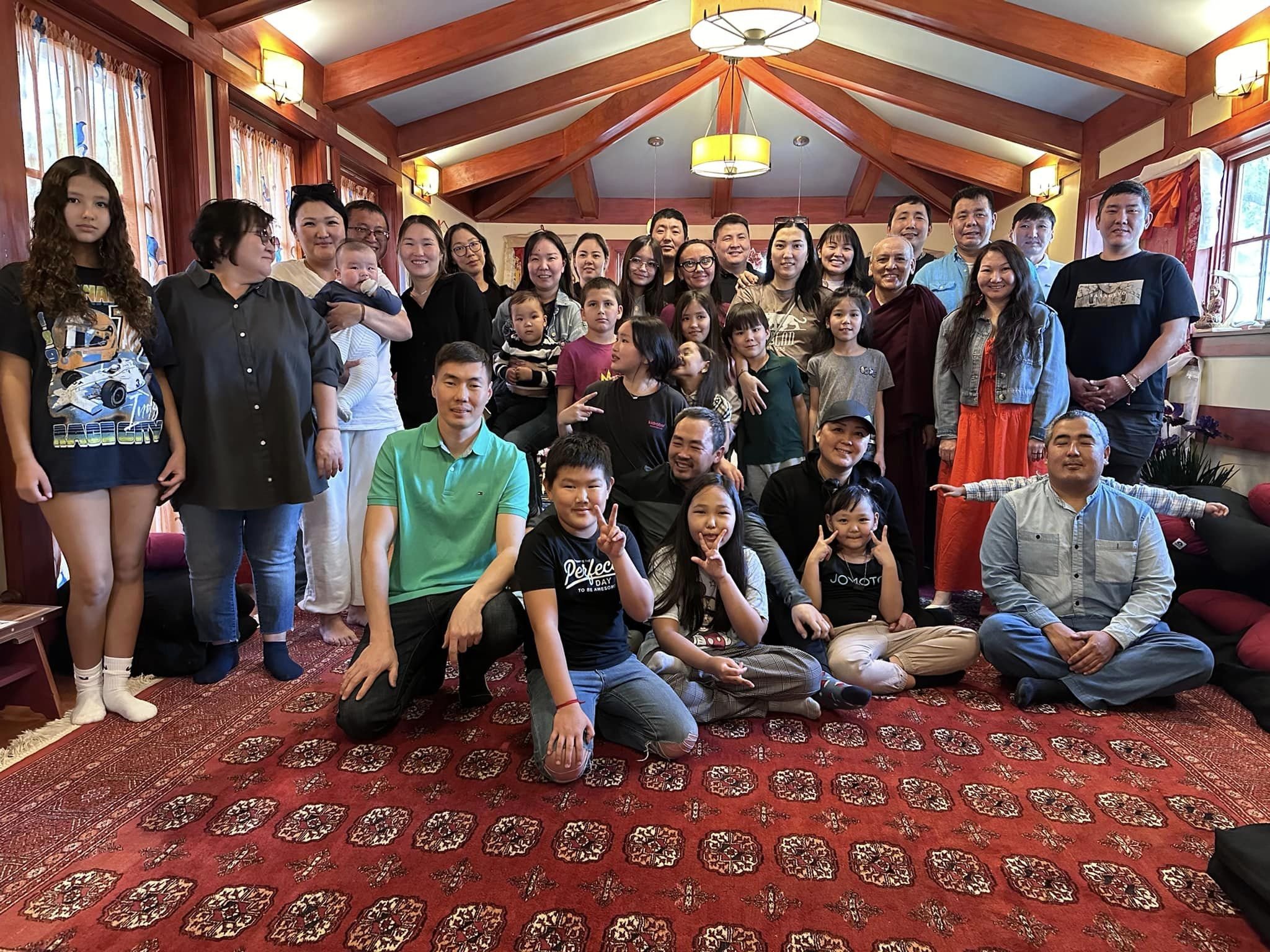
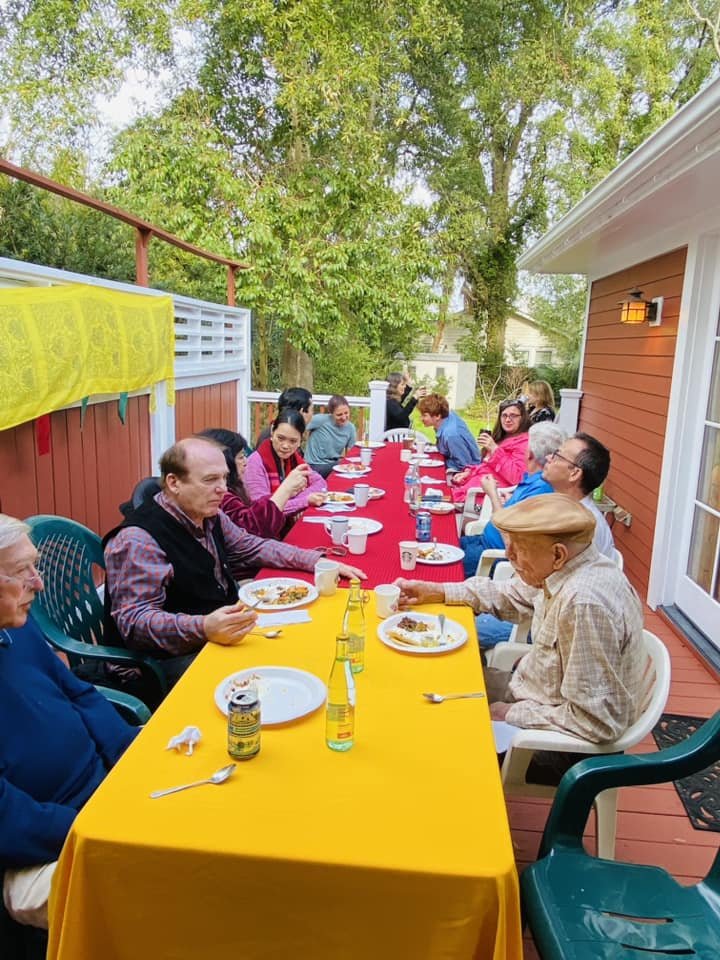
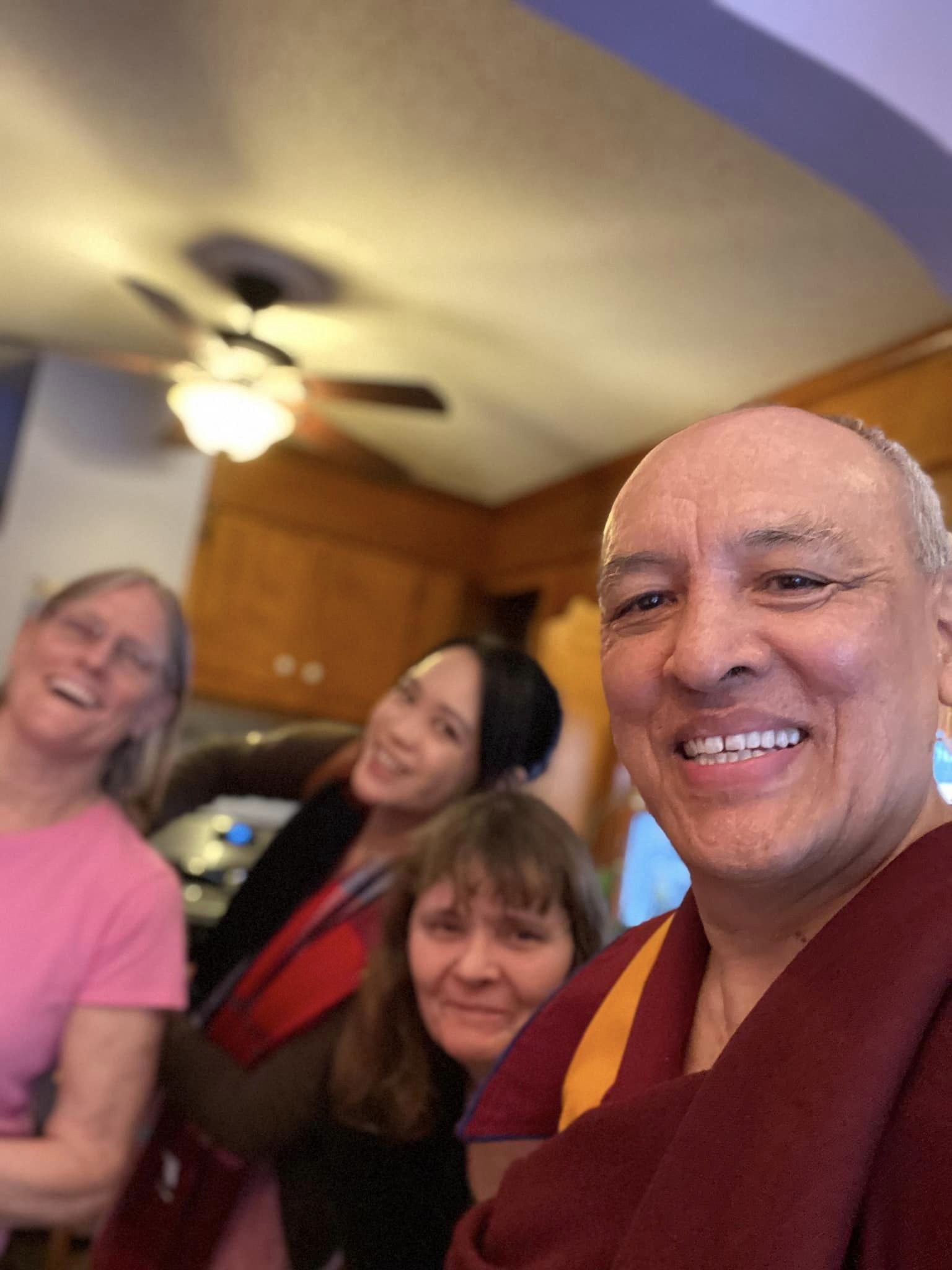
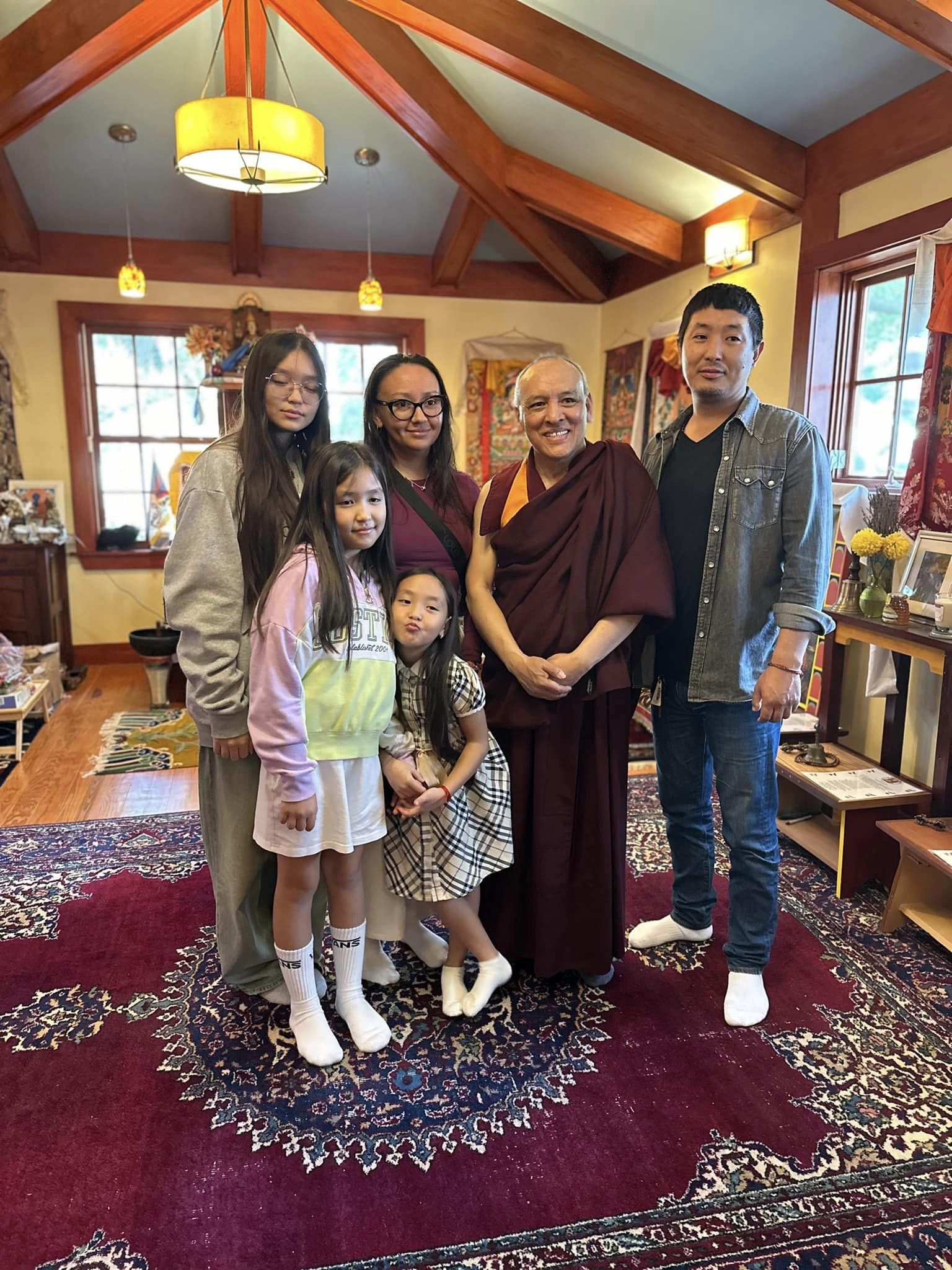
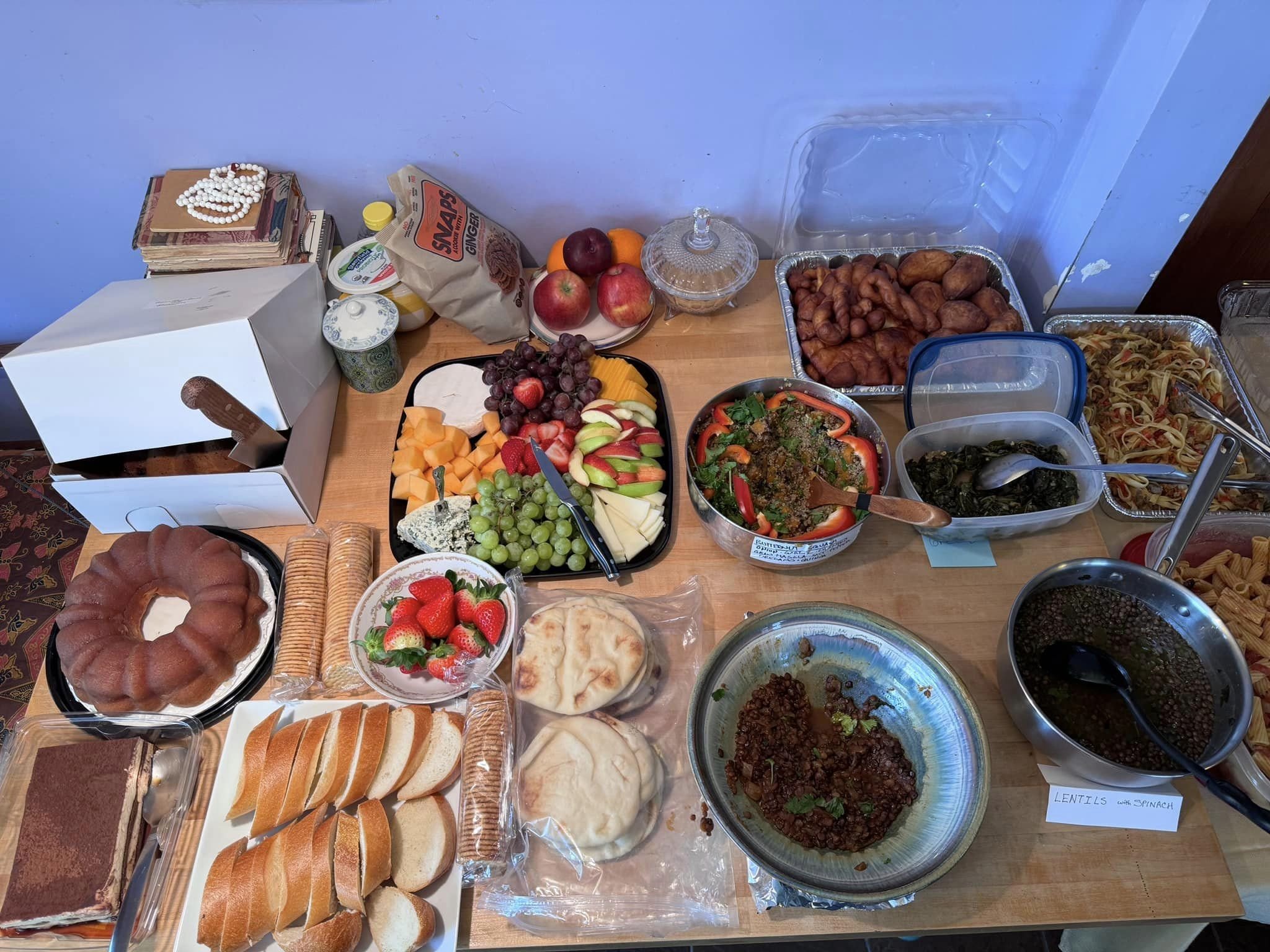
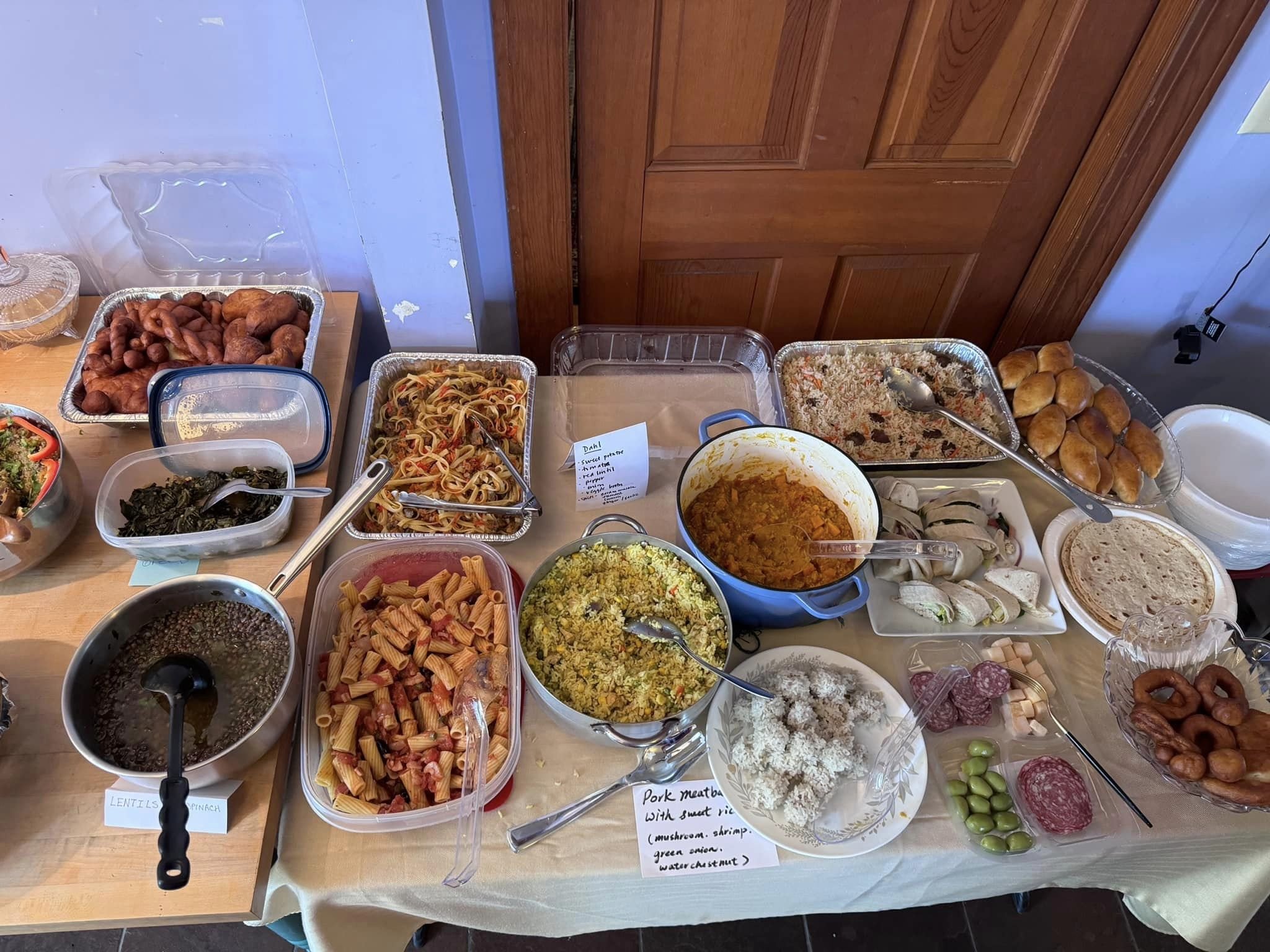
DECEMBER 7, 2023 ~ LAMA TSONGKHAPA DAY & MONGOLIAN NEW YEAR: Geshe la shared prayers & blessings with local mongolians for their new year as well as the anniversary of the passing of Lama Tsongkhapa, the found of the Gelug tradition.
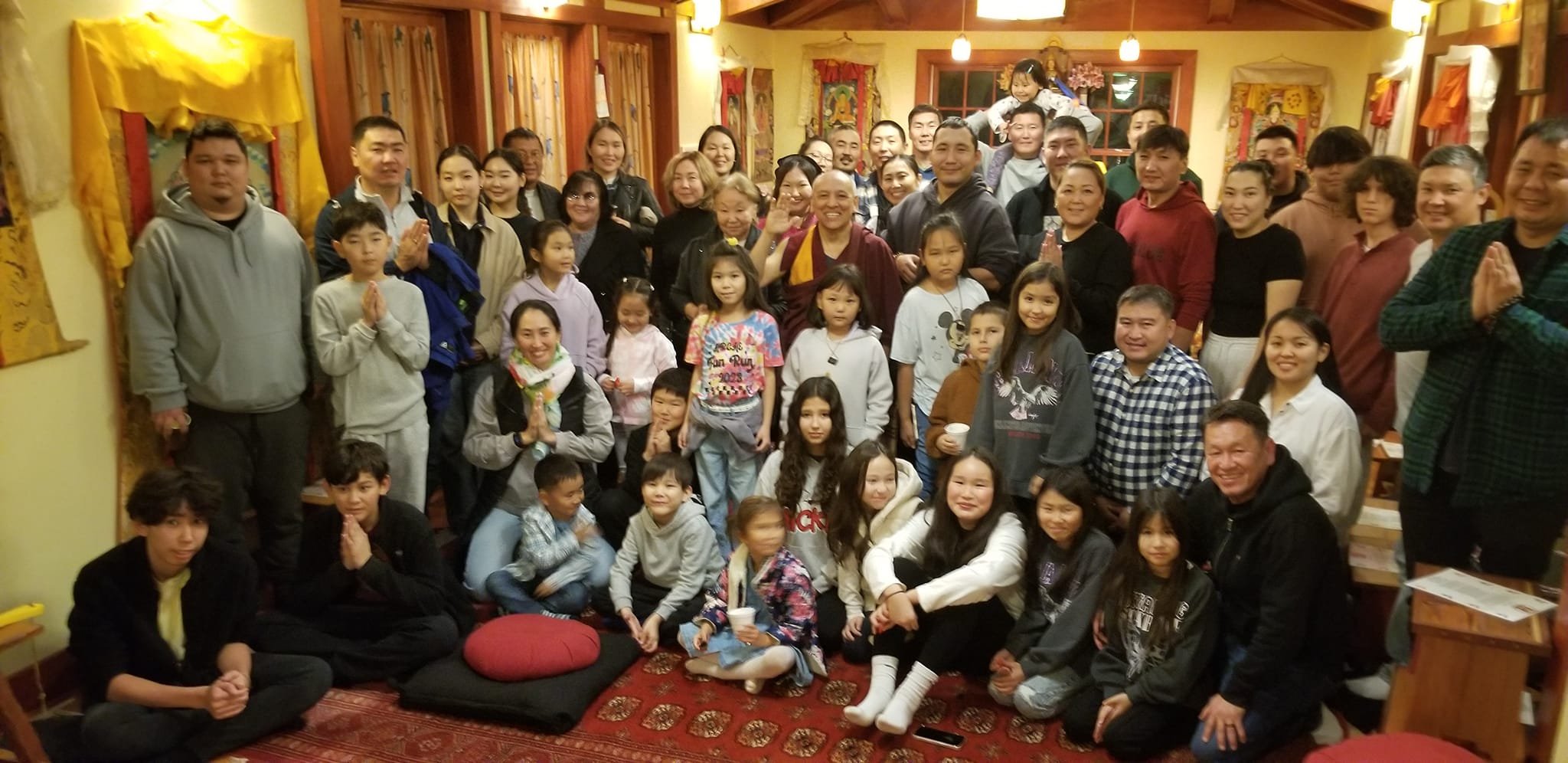
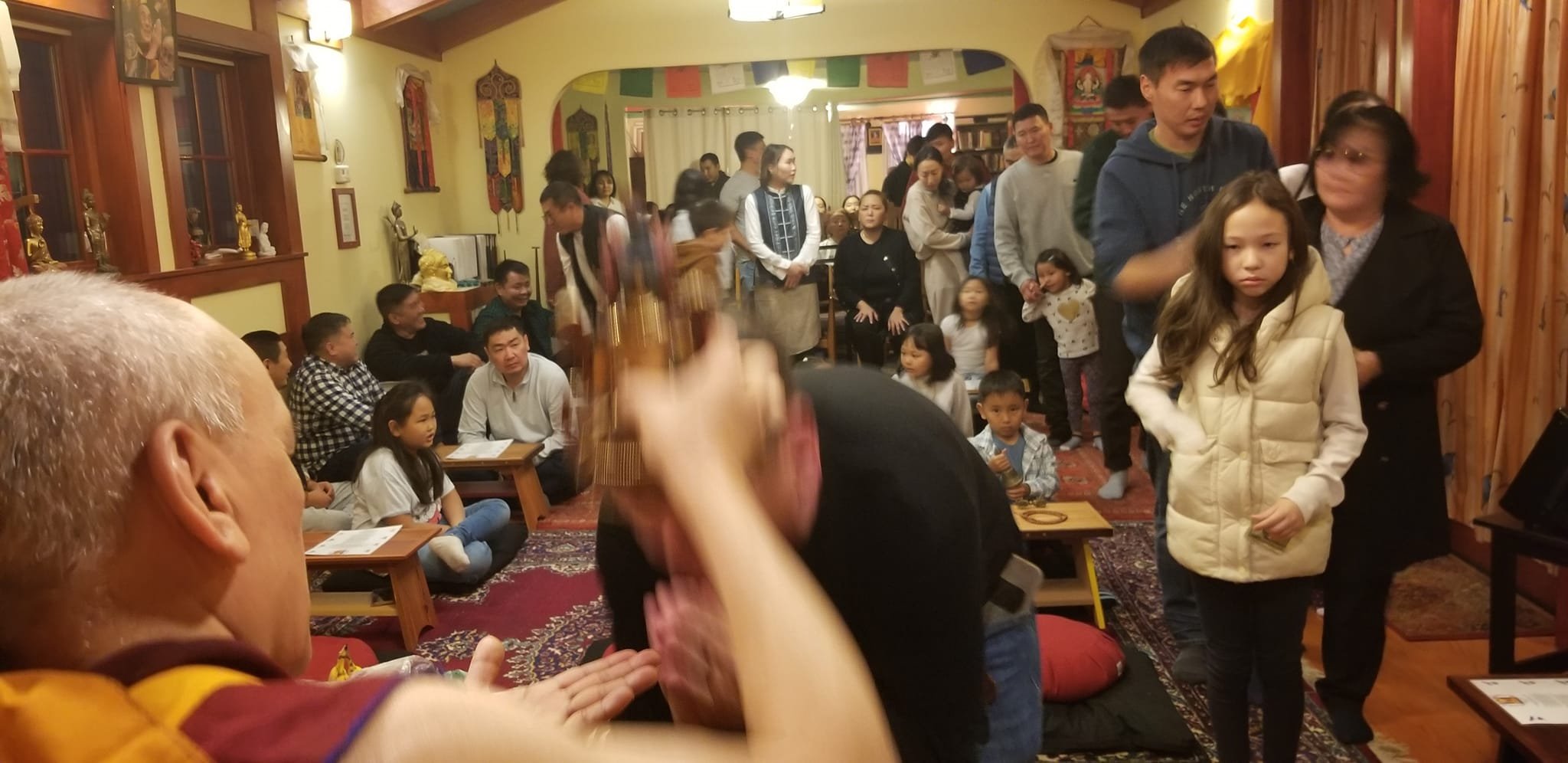
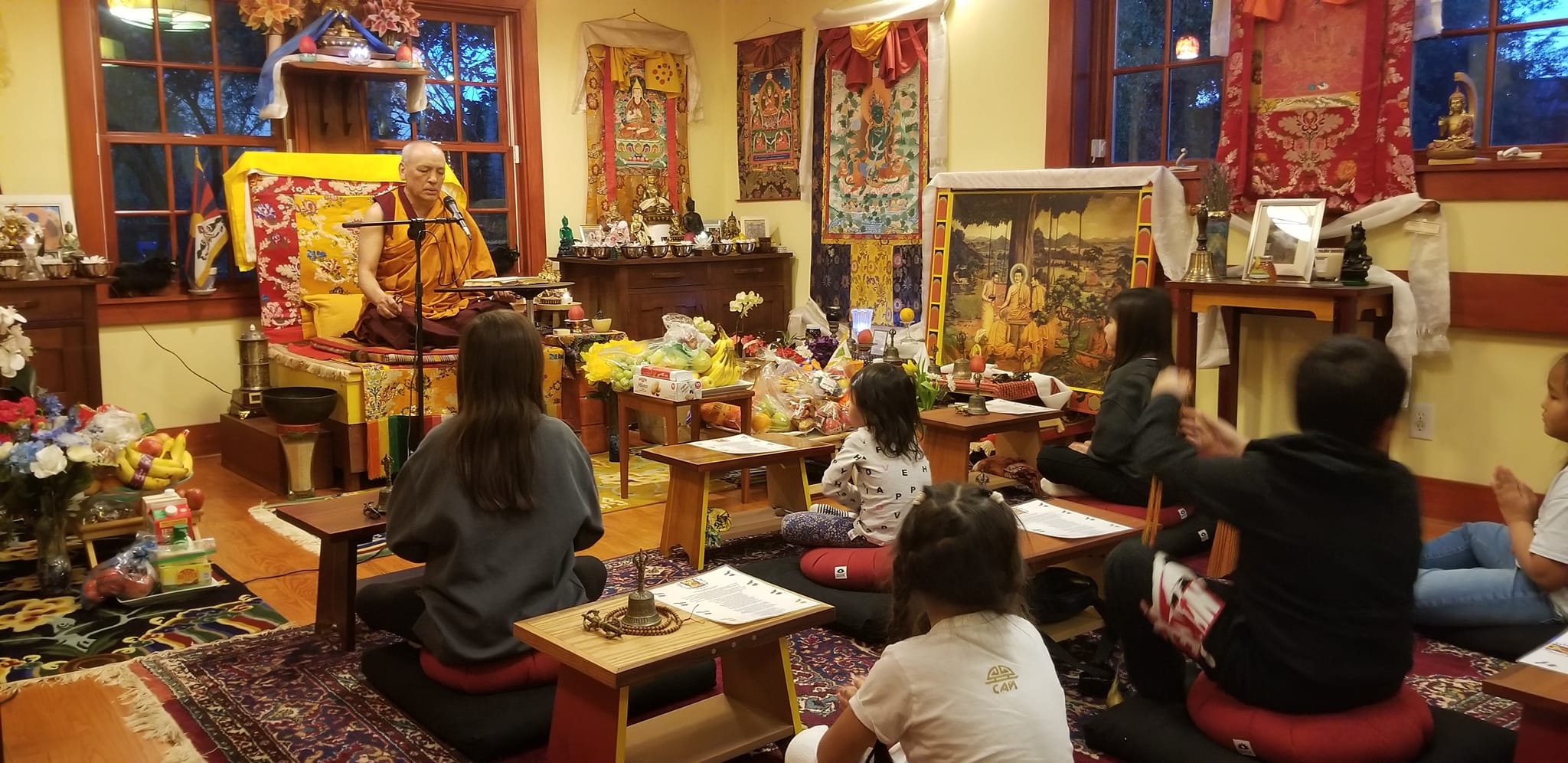
BRUNCH on SATURDAY, OCTOBER 28 @ 11am Healthy brunch among friends of idli, a savory rice cake originating from South India with chick pea hummus & Sambar, a vegetable soup, with sides of hard boiled egg, apples & banana as well as Geshe-la’s soothing chai on back deck of the dharma center.
july 8th, 2023 ~ His Holiness the 14th Dalai Lama’s 88th Birthday celebratory ceremony:
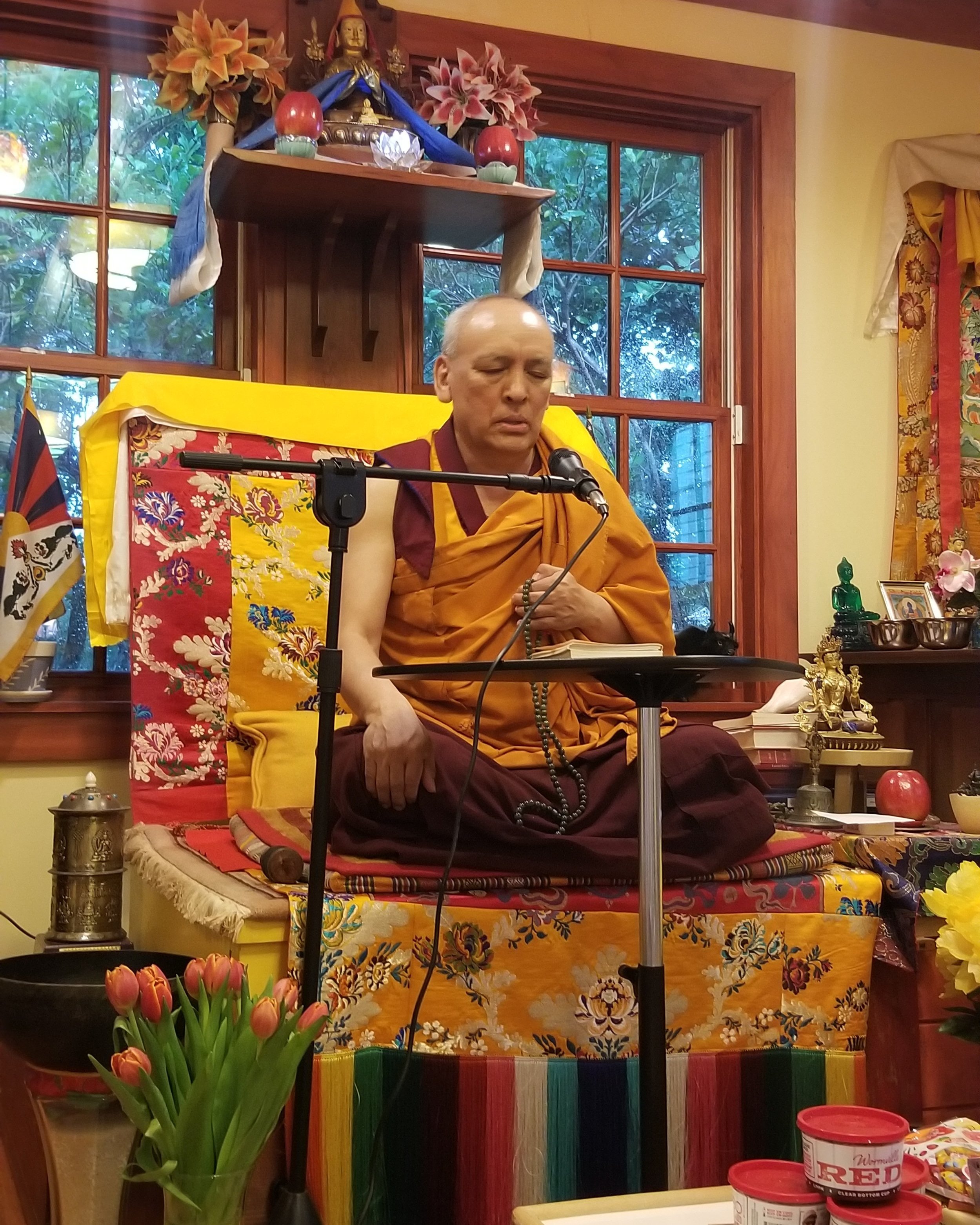
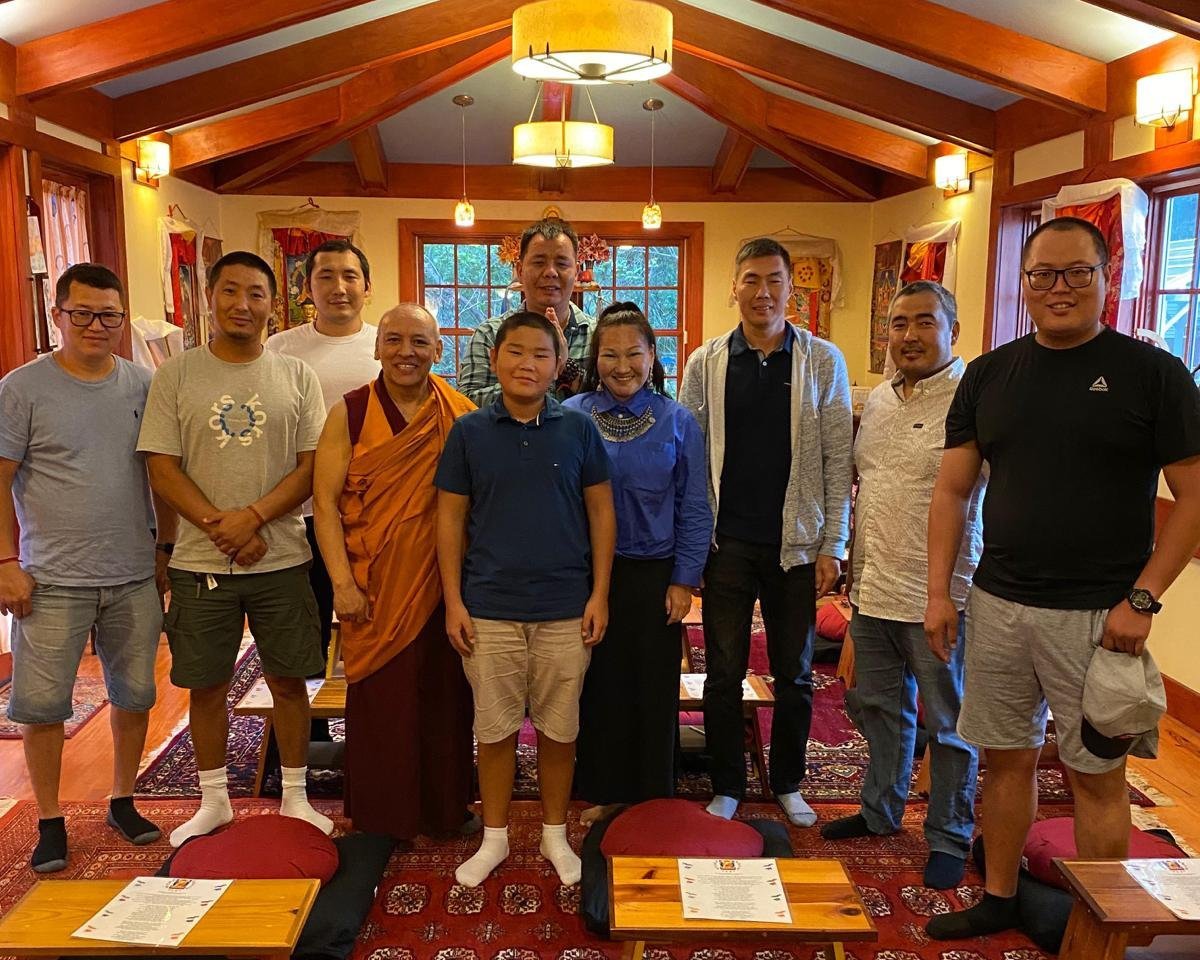
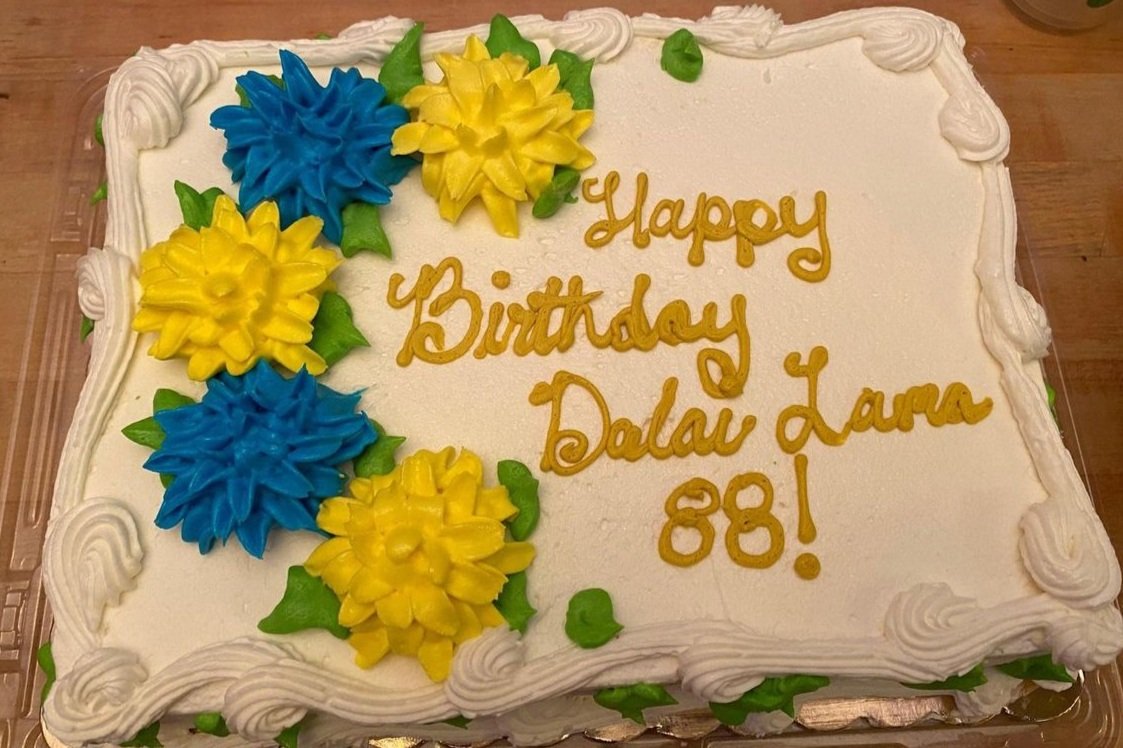
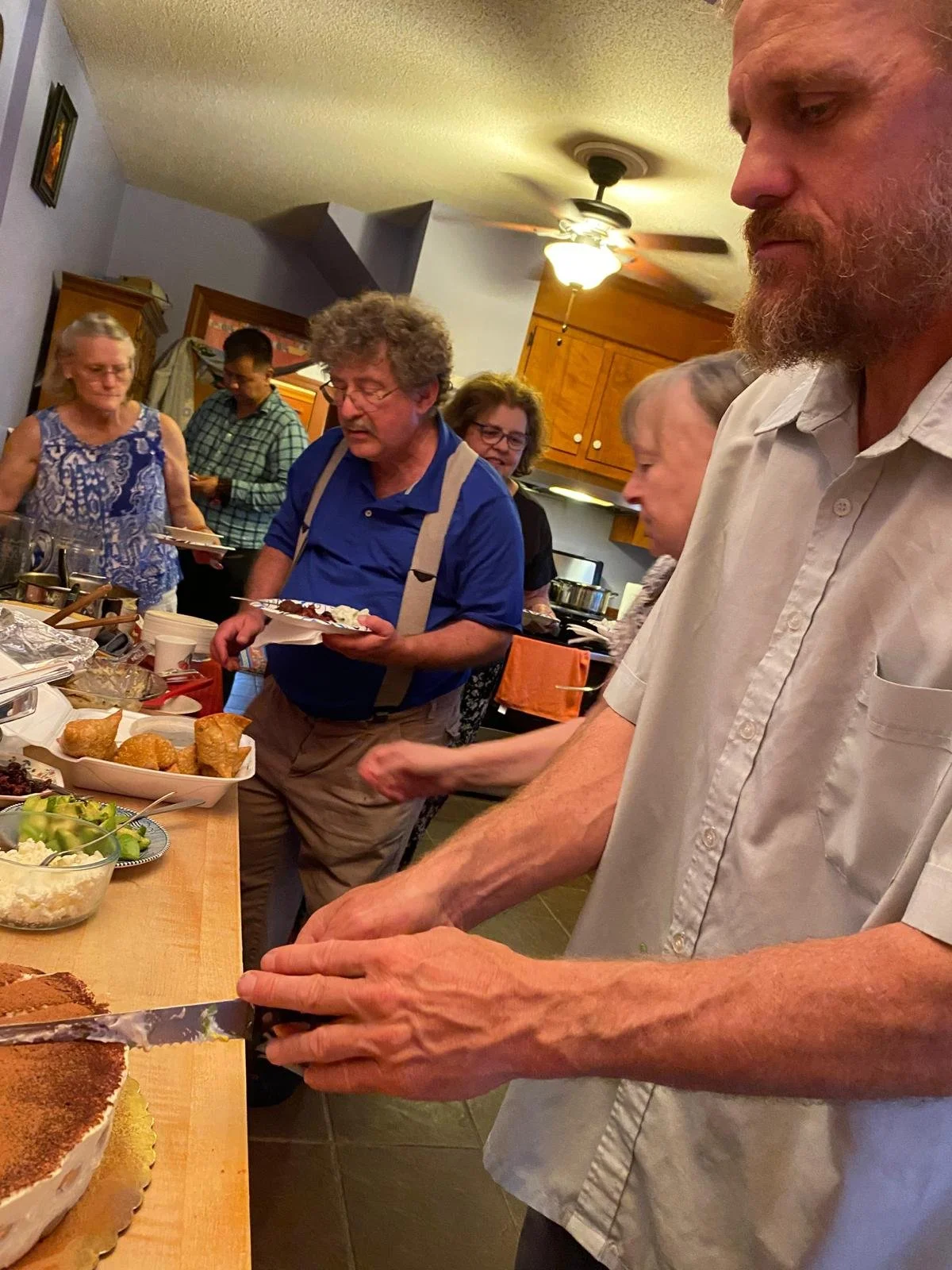
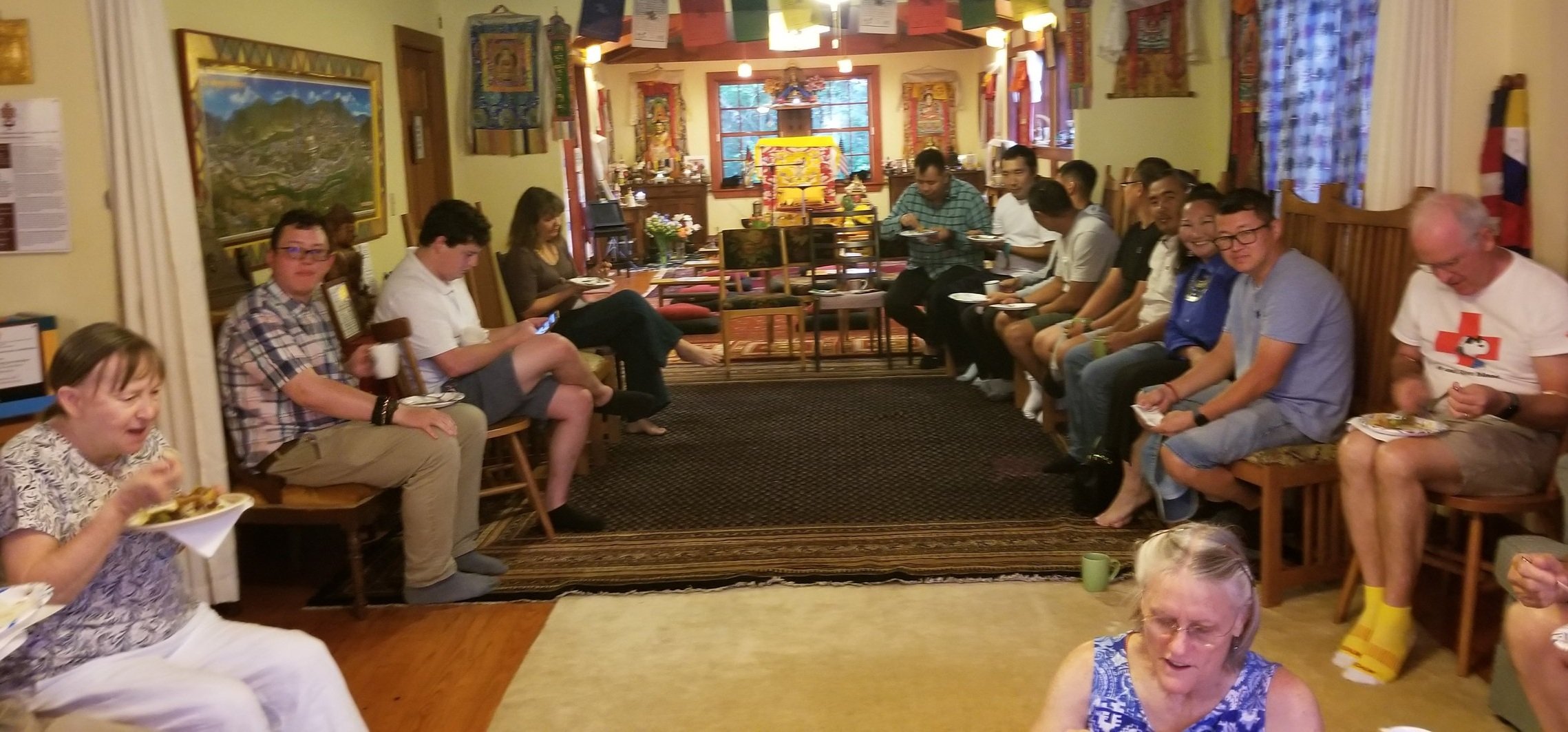
HOLY MONTH OF SAGA DAWA: FRIDAY, MAY 19 thru SUNDAY, JUNE 18
Buddha Shakyamuni
HOLY MONTH of SAGA DAWA
Friday, May 19 - Sunday, June 18, 2023
Culminating on Full Moon Saturday, June 3rd
Saga Dawa is a holy month for millions of Buddhists around the world. It is the month in which Shakyamuni Buddha was born, attained enlightenment, and passed into Nirvana. These 3 sacred events occurred on the full moon of the same month and are considered to be the 3 most sacred events of the historical Buddha's life on Mother Earth.
Saga Dawa will start from the new moon Friday, May 19, culminating on the full moon on Saturday, June 3 then waning back to the new moon on Sunday, June 18. The entire month of Saga Dawa is a great opportunity to accumulate merit due to the sacredness of the month and the magnification of the karma created, and so it is a special time to expand your compassion and generosity.
APRIL 25, 2023: We stand strongly with His Holiness the Dalai Lama! LONG LIVE the DALAI LAMA!
Statement from the Charleston Tibetan Society about the naive media’s reaction & misinterpretation to His Holiness the Dalai Lama’s meeting with Indian students on February 28th, 2023
Statement in English language from the Charleston Tibetan Society about the naive media’s reaction & misinterpretation to His Holiness the Dalai Lama’s meeting with Indian students on February 28th, 2023
Statement in Turkish language from the Charleston Tibetan Society about the naive media’s reaction & misinterpretation to His Holiness the Dalai Lama’s meeting with Indian students on February 28th, 2023
Statement in Kannada language from Charleston Tibetan Society about the media's reaction & misinterpretation to His Holiness the Dalai Lama's meeting with Indian students on February 28, 2023
DECEMBER 18, 2022 LOSAR: Charleston area locals with Mongolian homelands celebrate their New Year as well as the 603rd anniversary of the founder of the Geluk tradition's passing, Lama Tsongkhapa (1357-1409). Geshe-la shared compassionate blessings and touches a statue of Chenrezig, the Buddha of Compassion on all.
DECEMBER 15, 2022: Visiting students from The university school of the lowcountry: It was with great pleasure to share a talk on Tibetan Buddhism with ~80 inquisitive students & staff from the University School of the Lowcountry today. May they all continue to learn benefits of doing good in society in hopes to lead happy & fruitful lives filled with inner peace & joy!
DECEMBER 15, 2022: ~80 students & staff of the The University School of the Lowcountry at the Dharma Center
DECEMBER 15, 2022: ~80 students & staff of the The University School of the Lowcountry at the Dharma Center
SAGA DAWA 2022: May 30 - June 28, 2022
Buddha Shakyamuni
HOLY MONTH of SAGA DAWA
May 30 - June 28, 2022
Culminating on Full Moon Tuesday, June 14th
Saga Dawa is a holy month for millions of Buddhists around the world. It is the month in which Shakyamuni Buddha was born, attained enlightenment, and passed into Nirvana. These 3 sacred events occurred on the full moon of the same month and are considered to be the 3 most sacred events of the historical Buddha's life on Mother Earth.
Saga Dawa will start from the new moon Monday, May 30, culminating on the full moon on Tuesday, June 14 then waning back to the new moon on Thursday, June 28. The entire month of Saga Dawa is a great opportunity to accumulate merit due to the sacredness of the month and the magnification of the karma created, and so it is a special time to expand your compassion and generosity. A great way is to save sentient beings that would otherwise be killed thru purchasing and then releasing them in a safe and conducive habitat. Fiddler crabs and worms can be purchased at your local fishing tackle store and then released conducive habitats. Fiddler crabs should be released into tidal salt marshes and worms into your yard where you regularly see worms as not all soils are conducive as well as gardens where digging is likely to occur.
Saturday, February 12, 2022: A Celebration in honor of & gratitude to John Valentine-Castillo who is the following and so much more:
a dedicated student of Geshe Dakpa Topgyal
a founding member of the South Carolina Dharma Group
an engaged participant in dharma teachings from 1998 to 2022
Treasurer of SCDG from 2006 - 2021
Indefatigable worker on SCDG fundraising projects
Regular participant in SCDG retreats
Retreat student of His Holiness the Dalai Lama in Pennsylvania & Ladakh, India
Constant student of Tibetan texts and of Sanskrit and Pali vocabulary
qualified to answer questions about Tibetan Buddhism
qualified to be a Dharma instructor
He will be moving from South Carolina, so members of the SCDG & CTS enjoyed each others company, a potluck lunch including delicious mo-mo’s & a smoke puja ceremony at the Radiant Mind Retreat Center.
On Tuesday, July 6, 2021 will be His Holiness the Dalai Lama’s 86th birthday and as a gift he kindly asks us to mindfully recite at least 1,000 Mantra recitations of The Buddha of Compassion: Chenrezig in Tibetan or Avalokiteshvara in Sanskrit:
OM MANI PADME HUNG
He asks us, all his Brothers & Sisters, to cultivate a more compassionate mind, and to establish a genuine concern for others well-being. If possible, to serve other sentient beings including animals, and if no opportunity to serve others, to at least refraign from harming them. The best present for his birthday will be to saturate our mind with these virtuous states.
Long Life Prayers for His Holiness the Dalai Lama
In the land encircled by snow mountains,
You are the source of all happiness and good;
All-powerful Chenrezig, Tenzin Gyatso,
Please remain until samsara ends.
LONG LIVE HIS HOLINESS the DALAI LAMA!!!
saga dawa 2021 on wednesday, May 26, 2021: This morning on the most Auspicious Day of Saga Dawa ~250 worms were released on behalf of the CTS Spiritual Director, Sangha Members including CTS’ Sister organization The South Carolina Dharma Group, as well as Friends throughout the world for the benefit of ALL sentient beings, and previously ~75 fiddler crabs under rising moon. May each of us achieve enlightenment for the benefit of all sentient beings and make the most of this precious human form endowed with many freedoms & endowments on this most sacred day of Saga Dawa!!! On this Auspicious Day, remain mindful of our precious opportunities as we can accumulate much merit though even small virtuous acts of body, speech and mind, as well as dedicating such any merit for the enlightenment of all sentient beings.
Geshe-la shares the following wishes with us: May we ALL have many good lives, strong health, long life and strong confidence in many next life times as well as all sentient beings since we included them as recipients of the merits and virtues (we received thru this releasing of beings).
Some examples of practices and meritorious deeds that you can do are: 1. Prostrations 2. Mandala Offering 3. Making attractive & colorful material offerings of fresh flowers, candle lights, fragrant incense, fresh and scented water offering before the enlightened beings 4. Giving material help of food, drink, clothing, and medicine to the poor & needing ones 5. Releasing lives 6. Abstaining from eating meat and alcohol 7. Observing celibacy 8. Meditating and putting effort to do intensive spiritual practices of Love, Compassion, meditation, purification and Tong-Len (Giving & taking) Practice
HOLY MONTH of SAGA DAWA: May 11 - June 10, 2021 ~> Culminating on Full Moon Wed, May 26th
Saga Dawa is a holy month for millions of Buddhists around the world. It is the month in which Shakyamuni Buddha was born, attained enlightenment, and passed into Nirvana. These 3 sacred events occurred on the full moon of the same month and are considered to be the 3 most sacred events of the historical Buddha's life on Mother Earth.
Saga Dawa will start from the new moon Tuesday, May 11, culminating on the full moon on Wednesday, May 26 then waning back to the new moon on Thursday, June 10. The entire month of Saga Dawa is a great opportunity to accumulate merit due to the sacredness of the month and the magnification of the karma created, and so it is a special time to expand your compassion and generosity. A great way is to save sentient beings that would otherwise be killed such as by fishermen or by butchers, and released in a safe and conducive habitat.
Please RSVP at CharlestonTibetanSociety1@gmail.com so we know how much food to prepare. Thank You!


